Annual Report 2014





Médecins Sans Frontières is a private international association. The association is made up mainly of doctors and health sector workers and is also open to all other professions which might help in achieving its aims. All of its members agree to honor the following principles:
Médecins Sans Frontières offers assistance to populations in distress, to victims of natural or man-made disasters and to victims of armed conflict, without discrimination and irrespective of race, religion, creed or political affiliation.
Médecins Sans Frontières observes neutrality and impartiality in the name of universal medical ethics and the right to humanitarian assistance and demands full and unhindered freedom in the exercise of its functions.
Médecins Sans Frontières’ volunteers undertake to respect their professional code of ethics and to maintain complete independence from all political, economic and religious powers.
As volunteers, members are aware of the risks and dangers of the mission they undertake, and have no right to compensation for themselves or their beneficiaries other than that which Médecins Sans Frontières is able to afford them.
Over the course of 2014
Médecins Sans Frontières has responded to a number of crises internationally, including the ongoing conflict in Syria, displacement in Iraq and continued challenges in South Sudan. The headline item for the year has to be the Ebola response in West Africa, a context which pulled many Australian and New Zealand field workers into the fray once more.
Stewart Condon President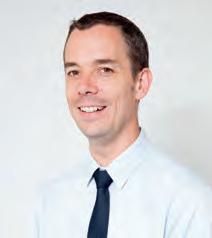
The Syrian conflict entered its fourth year in 2014, showing how destructive displacement can be. There are now more than 10 million people displaced from this conflict, either remaining in Syria or across country borders. Médecins Sans Frontières continues to operate medical facilities inside Syria, as well as directly supporting more than a hundred clinics, health posts and field hospitals through networks of dedicated field staff. But operating in this context remains extremely challenging due to the ongoing violence and insecurity that includes attacks on health facilities and medical workers. Five international Médecins Sans Frontières field workers were taken hostage by Islamic State in January 2014, and thankfully were subsequently released. Following this incident we made the difficult decision to stop working in IS-controlled areas until we could receive guarantees that our staff and facilities would not be targeted. Read more about our activities in Syria on page 47.
Globally, the number of displaced people is now at its highest level since World War 2, and the ongoing conflict in Syria has been a significant contributor to this grim record. Refugees from Syria flooded across the borders into neighbouring Jordan, Lebanon and Iraq in 2014. Médecins Sans Frontières is the primary healthcare provider in a number of refugee camps in these countries, helping support local health systems beginning to buckle under the weight of these refugees’ needs.
In Iraq, there was huge internal displacement in 2014 due to a massive escalation in the conflict. The continued insecurity has made it difficult to deliver humanitarian assistance, especially in northern and central Iraq. Médecins Sans Frontières facilities have been directly damaged in the fighting, and staff have been forced to flee as Islamic State proceed to take more territory. Nonetheless, Médecins Sans Frontières launched emergency interventions including running mobile clinics, distributing relief items, and providing comprehensive healthcare including reproductive health and mental health services. Read more about our activities in Iraq on page 28.
Conflict and displacement were also the hallmarks of the humanitarian crisis facing South Sudan. As fighting spread throughout the country in 2014, we increased the number of projects from 13 to more than 20 across nine states. By the end of 2014, an estimated 1.5 million people were internally displaced. Médecins Sans Frontières teams provided everything from vaccination campaigns to high-risk obstetric care.
On the other side of Africa, the outbreak of Ebola virus disease in Sierra Leone, Liberia and Guinea prompted one of Médecins Sans Frontières biggest ever emergency responses. By the end of 2014, almost 8,000 people had lost their lives, including 13 of our staff members. In the face of global inaction, Médecins Sans Frontières was responsible for providing the bulk of the isolation units and beds and cared for one third of all confirmed cases. More than 2,000 patients recovered from Ebola infection in our facilities. Médecins Sans Frontières repeatedly spoke out on the fact that the outbreak was unprecedented, and that it could not be tackled by us alone. We called for increased on-the-ground response by international actors, including the Australian government.
The outbreak tested our limits, forcing us to make difficult choices in the face of competing priorities and at some points in the outbreak we were completely overwhelmed by the patient numbers which tragically
Médecins Sans Frontières Australia2014 was characterised by humanitarian crises of historic proportions, including the world’s largest ever Ebola outbreak and global displacement exceeding 50 million people worldwide.© Meredith Schofield Médecins Sans Frontières Australia
forced us to turn patients away. We diverted human resources from other emergency projects, opened a 250-bed Ebola management centre (when prior to this, a 40 bed centre was our largest), and embarked upon one of our largest knowledge transfer efforts by training our staff and those in other organisations regarding safe Ebola management. We also made unprecedented decisions such as hosting trials of experimental treatments and vaccines during an outbreak.
My first year as president of Médecins Sans Frontières Australia has been one of transition, building upon my time on the Board to date. My thanks go far and wide, to the volunteers who contribute to our social mission, either in the office or in the field. Thanks to our Executive Director, Paul McPhun, and his team in the Sydney office who live and breathe Médecins Sans Frontières’ work, consistently delivering on our goals. To those of you who continue to donate to the
organisation – thank you! Without your support our budget would not exist in the way that it does, and we would not be able to afford our ambitions. And to those Board members past and present, committee members, association members, field workers, alumni and Médecins Sans Frontières-friends who continue to offer specialised advice and expertise – thank you for your work and dedication to this incredible organisation.
Stewart Condon President Médecins Sans Frontières Australia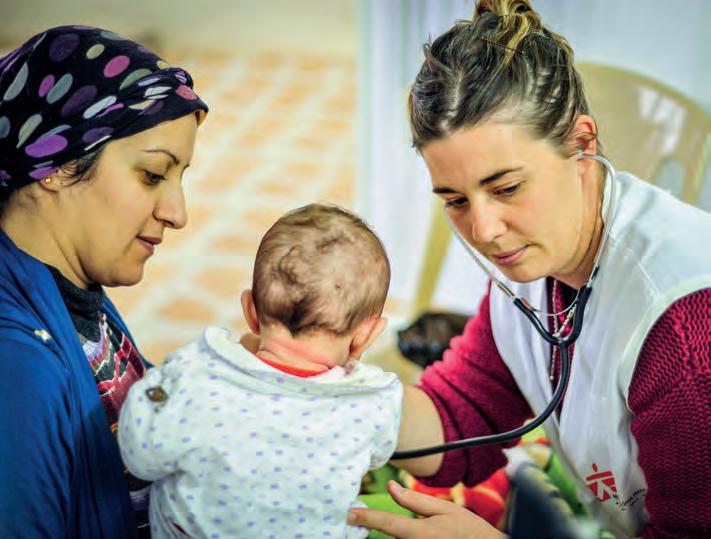
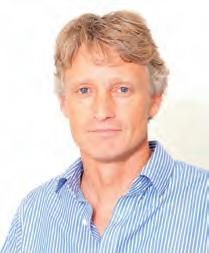
Médecins Sans Frontières faced many acute emergencies in 2014. In addition to some of our large scale operations that saw new surges in conflict and displacement, like Syria, South Sudan and Central African Republic we also found ourselves on the frontline in Ukraine, and bunkered in hospitals as war raged again across the Palestinian territories. The eyewitness accounts from our surgical teams operating on men, women and children in Gaza embodied the role of Médecins Sans Frontières – saving lives and denouncing the horrors caused by war. However, it is the Ebola epidemic that has come to define 2014, and write a new chapter in what medical humanitarian assistance stands for, and has to be prepared to manage.
Ebola virus disease has now become a household term across the world. The outbreak that spread from rural communities in Guinea to urban towns and cities in Liberia and Sierra Leone invoked reactions of fear and policies of border containment around the world. As Médecins Sans Frontières called on the world to intervene in West Africa we scaled up our own operations to unprecedented levels, rotating hundreds of experienced staff from around the world including Australians and New Zealanders who filled 36 field positions. For the first time since the 2004 Rwandan genocide Médecins Sans Frontières appealed to nations with military and civilian assets to mobilize these as we faced thousands of people infected and dying. Many Australian and New Zealand team members witnessed the horror that accompanied the rapid spread of this disease and were forced to make the most difficult ethical choices when clinics were overwhelmed by the numbers of patients seeking treatment. They also witnessed the incredible resilience of the community, the local medical staff committed day in day out to their jobs, and the individual patients who tried to care for each other.
Led by our advocacy team, Médecins Sans Frontières Australia worked through all channels to desperately try to persuade the Australian government to swiftly add their resources to the fight against Ebola in West
Africa. We turned down an offer of funding when this seemed likely to be the extent of the Australian Government’s commitment. It was clear that merely providing funds to overstretched organisations like Médecins Sans Frontières was an insufficient response from a well-resourced nation like Australia. This crisis could only be contained by a massive deployment of personnel and logistics from countries like Australia with the capacity and ability to do so and this continued to our message both privately and publicly.
In 2015, we will continue the fight against Ebola and address the need to reconstruct the health systems of the three worst-affected countries. As this annual report goes to print, Médecins Sans Frontières teams continue to work hard to contain the virus, and although transmission rates have reduced massively, new cases are still recorded each week in Guinea and Sierra Leone.
Our work in the field was, as always supported by our dedicated Médecins Sans Frontières Australia office team.
The Médecins Sans Frontières Australia communications team continued to ensure that the humanitarian needs facing our patients are not overlooked. In 2014 we directly supported field communications in Cambodia, Central African Republic, Iraq, Palestine and Papua New Guinea, while the Ebola outbreak contributed to a huge increase in our media coverage and dominated much of our communications. The team also remained focused on communications around women’s and children’s health, in collaboration with the Sydney-based Medical Unit, including developing a communications package and event to mark International Women’s Day. We also raised awareness among new audiences through a campaign emphasising the core principles that drive our medical humanitarian action, such as independence, impartiality and bearing witness.
Demands for Médecins Sans Frontières Australia’s advocacy work from around the movement grew
2014 will undoubtedly go down in history as the year that the global community and the aid system at large was tested by the threat of a rapidly spreading deadly infectious disease – and largely failed, responding late and reluctantly to the Ebola outbreak in West Africa.
significantly in 2014, reflecting the grave scale and number of humanitarian emergencies. In addition to our work on Ebola, we continued to support the Médecins Sans Frontières Campaign for Access to Essential Medicines particularly in their work to promote access to new tuberculosis (TB) drugs, more affordable vaccine prices and to oppose intellectual property provisions in the Trans Pacific Partnership trade deal which threatens to keep drug prices higher for longer. Finally, our support for projects in Papua New Guinea grew with the opening of a new TB project in Gulf province which has benefitted from strategic engagement with the Department of Foreign Affairs and Trade’s PNG team to ensure that our patients can access the most effective treatment.
The Sydney office provided expertise on women’s health and paediatrics to projects worldwide, through Médecins Sans Frontières Australia’s Medical Unit. The Medical Unit prioritised integrating
women’s health activities into emergency response interventions in 2014, including with South Sudanese refugees in Uganda and in the Central African Republic. Read more about the Medical Unit’s work on page 11.
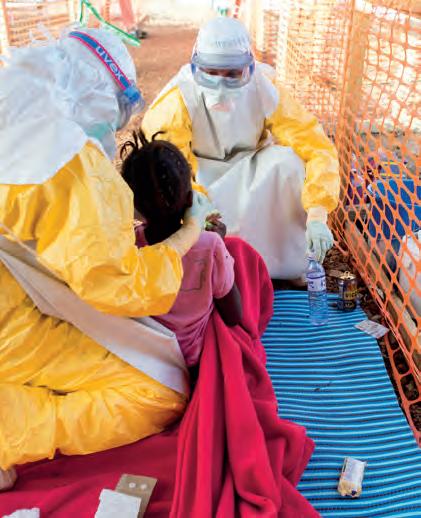
The number of humanitarian emergencies placed a high demand on our field human resources staff. Through their considerable efforts, Australian and New Zealand field workers filled a total of 190 field positions in 31 different countries. A total of 28 Australians and New Zealanders travelled to West Africa as part of Médecins Sans Frontières’ Ebola response. The countries supported by the most Australian and New Zealand field staff in 2014 were South Sudan, Liberia, Pakistan, Ethiopia, Sierra Leone, Iraq, Jordan, Myanmar, Yemen and the Central African Republic.
Following another year of increased activities in our Sydney office during 2014, our team size and overhead costs have remained stable, with the focus being on finding more efficient ways to function. The finance and administration team continue to work hard to ensure a high level of accountability.
An investment in domestic HR resulted in a new strategy for a strong future and our administration team continued to drive cost efficiencies wherever possible. Our information technology team continue to provide excellent service to the office, and our professional service (call) centre team expanded to meet the individual needs of our growing supporter base. I was also incredibly grateful for the countless volunteers who dedicated their time on a daily basis to the activities in the office.
I was humbled by the particularly generous financial support we received from the Australian public in 2014. The Australian public donated a total of $72.3 million, mostly through the Field Partner monthly giving program. Many supporters were motivated by the devastating images coming out of West Africa, and the leading role taken by Médecins Sans Frontières in fighting the Ebola outbreak. But I was thankful for the ongoing trust you place in us by providing untied funding, allowing us to provide humanitarian assistance where it is needed most. As you will see throughout this report, your donations allowed us to support many other essential medical programs beyond the Ebola outbreak. On behalf of our field staff and patients, thank you for your ongoing and generous support. It is so very much appreciated.
Paul McPhun Executive Director Médecins Sans Frontières Australia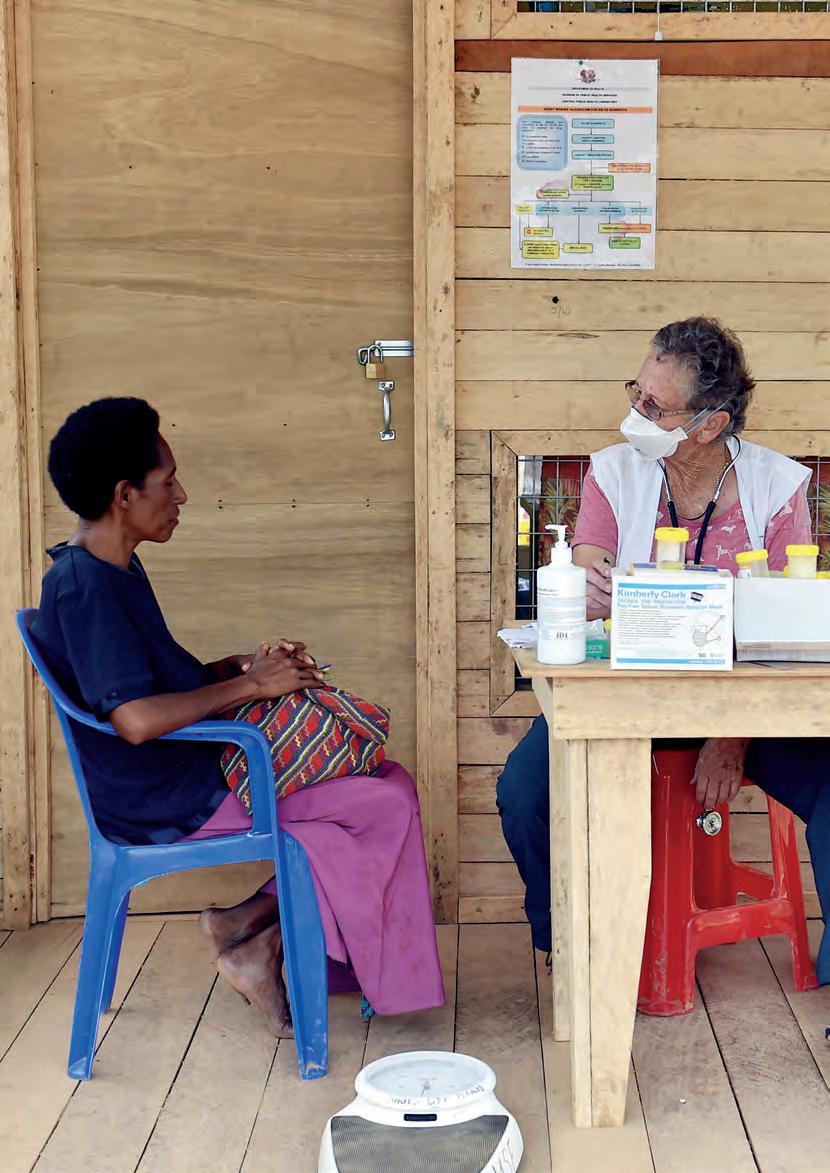
Field workers from Australia and New Zealand filled 190 field roles in 2014, contributing their professional skills to an international Médecins Sans Frontières workforce of around 35,000 people.
AFGHANISTAN
Daron Cunningham surgeon
Cindy Gibb nurse
Sam Templeman nurse
Louise Timbs nurse
Diana Wellby obstetrician-gynaecologist
CAMBODIA
Elizabeth Campbell nurse
Joonhong Min other
CAMEROON
Katy Brown nurse (two field placements)
Clement Kaheba Honda medical team leader
Rachel Marsden field coordinator
Katy Brown nurse
Jezra Goeldi logistics team leader
Clement Kaheba Honda nurse
Damien Moloney general logistician
Annekathrin Muller theatre nurse (two field placements)
April Murphy nurse
Maria Ruiz Laconcepción theatre nurse
Henri Stein logistics coordinator
CHAD
Rachel Creek general logistician
Paras Valeh medical team leader
DEMOCRATIC REPUBLIC OF CONGO
Devi Lalloo medical team leader
Brian Willett field coordinator
ETHIOPIA Emma Bailey nurse
Monica Burns nurse
Veronique De Clerck medical coordinator
Andrew Dimitri medical team leader
Jacqueline Gowers nurse
Lisa Gray nurse
Emily McGrath nurse
Sally Thomas construction logistican
Jeanne Vidal water-sanitation logistician
Chris Withington general logistician
HAITI
Mohana Amirtharajah surgeon
Melissa Hozjan nurse
INDIA
Tambri Housen epidemiologist
IRAQ
Sita Cacioppe medical team leader
Sue Cory medical doctor
Jim Cutts electrician-logistician
Pietro Dal Dosso general logistician
Steven Denshire general logistician
Jeff Fischer general logistician
Gregory Keane psychiatrist
Warren Keen general logistician
Jessica Lovel nurse
Natalie Schulz administration-finance coordinator
JORDAN
Janet Coleman midwife
Gillian Deakin medical doctor
Fiona Gillett midwife
William Johnson electrician-logistician
Virginia Lee counsellor
Danielle Moss administration-finance coordinator
Sebastian RubinszteinDunlop medical doctor
KENYA
Madhumati Chatterji medical doctor
Janthimala Price field coordinator
Paul Yarnall general logistician
LEBANON Don McCallum general logistician
LIBERIA
Brett Adamson field coordinator and medical coordinator (two field placements)
Danielle Ballantyne nurse
Rebecca Bennett psychologist
Monica Burns nurse
Prue Coakley field administrator
Philippa Collins health promoter
John Cooper water-sanitation logistician
Jim Cutts general logistician
Hugo De Vries general logistician
Cath Deacon medical doctor
Jezra Goeldi general logistician
Louise Johnston health promoter
Robert Onus general logistician
Ruth Osadebay nurse
David Pittaway health promoter
Caitlin Ryan communications officer (two
field placements)
Rose Stephens nurse
Barbara Telfer epidemiologist
Chatu Yapa medical doctor head of mission* medical doctor* nurse* general logistician* nurse* general logistician*
LIBYA
Kelly Wilcox field coordinator
MALAWI
Nicolette Jackson assistant head of mission
Monica Muturi nurse
MYANMAR
Cindy Chiu epidemiologist
Philippa Collins nurse
Aisleen Glasby nurse
Rachel Marsden field coordinator
Brian Willett field coordinator
NIGERIA
Raymond Garry obstetrician-gynaecologist
Alan Hughes
obstetrician-gynaecologist
David MacFarlane obstetrician-gynaecologist
Caroline Nyoni midwife
Cassie Stephens general logistician
PAKISTAN
Annie Chesson midwife
Colin Chilvers anaesthetist
Emma Clark medical doctor
Philippa Cox midwife
Jessica Dwyer nurse
Siry Ibrahim general logistician
Corrinne Kong administration-finance coordinator
Peter Mathew surgeon (two field placements)
Catherine Moody head of mission
Nikola Morton medical doctor
Annekathrin Muller nurse
Rhiannon Palmer medical doctor
Helle Poulsen-Dobbyns field coordinator (two field placements)
Miho Saito midwife
Thomas Volkman medical doctor
Diana Wellby obstetrician-gynaecologist
PALESTINE
Eileen Goersdorf theatre nurse
John Swinnen surgeon
Raewyn Turner theatre nurse (two field placements)
PAPUA NEW GUINEA
Carmel Morsi nurse
PHILIPPINES
Rachel Creek logisticics coordinator
Hugo De Vries construction logistican
Janine Issa midwife
Anne Taylor head of mission
RUSSIAN FEDERATION
Gillian Deakin medical doctor
Bronwynne McNeill nurse
SIERRA LEONE
Daniel Baschiera
water-sanitation logistician
Emma Campbell field administrator
John Cooper
water-sanitation logistician
Louisa Cormack
water-sanitation logistician
Frederick Cutts
electrician-logistician
Sarah Dina psychologist
Jennifer Duncombe epidemiologist
Michel Geurts field administrator
Malcolm Hugo psychologist
Kamalini Kalahe-Lokuge epidemiologist
Emily McGrath nurse (two field placements)
Clair Mills medical coordinator
David Nash field coordinator
Katrina Penney nurse
SOUTH SUDAN
Haydar Alwash surgeon
Ursula Alwash theatre nurse
Rebecca Bennett psychologist
Katy Brown nurse
Sita Cacioppe medical team leader
Philippa Collins nurse
Steven Denshire general logistician
Sandra Downing epidemiologist
Mee Moi Edgar administration-finance coordinator
Lisa Errol midwife
Kate Ferguson nurse
Judith Forbes anaesthetist
Rebecca Grivas medical doctor
Liam Hannon medical doctor
Michael Hering general logistician
Malcolm Hugo psychologist
Amy Le Compte midwife
Rachel Marsden field coordinator
Paul Martyn obstetrician-gynaecologist
David McGuinness nurse
Damien Moloney water-sanitation logistician
Rhiannon Palmer medical doctor
Jessica Paterson administration-finance coordinator
Miho Saito nurse-midwife
Kiera Sargeant nurse
Michael Seawright field coordinator
Robyn Silcock medical doctor
Sam Templeman nurse
Melanie Triffitt field administrator
Rebecca Walley nurse
SWAZILAND
Karen Chung medical doctor
Rachel Sun pharmacist
SYRIA
Michelle Fadelli field administrator
Kristen McClelland nurse
Damien Moloney logistics team leader
Catherine Moody assistant head of mission
Danielle Moss field administrator
Michael Seawright field coordinator
UGANDA
Caroline Nyoni midwife
Jacinta O’Leary midwife
UZBEKISTAN
Catherine Berry medical doctor
YEMEN
Shanti Hegde obstetrician-gynaecologist (two field placements)
John Millard general logistician
Arjuna Nagendra anaesthetist
Sivapalan Namasivayam anaesthetist (two field placements)
Jenifer Reynolds anaesthetist
This list of field workers comprises only those recruited by Médecins Sans Frontières Australia. We also wish to recognise other Australians and New Zealanders who have contributed to Médecins Sans Frontières programs worldwide but are not listed here because they joined the organisation directly overseas. * Some people who completed field assignments in West Africa would prefer to stay anonymous so we have listed their field roles but not their names. Médecins Sans Frontières Australia Australian and New Zealand field staff in 2014An increased focus on neonatal care and the increasing integration of women’s health into emergency responses were two of the highlights for the Medical Unit in 2014.
Médecins Sans Frontières Australia continued to provide expertise on women’s health and paediatrics to projects worldwide in 2014, through the Sydney-based Medical Unit. The Unit is part of the medical department of Operational Centre Paris, and focuses on improving outcomes for some of Médecins Sans Frontières’ most vulnerable patients –women and children. In 2014, in addition to providing ongoing support to all projects, Medical Unit team members provided direct field-based support through field visits to Afghanistan, Cote d’Ivoire, Democratic Republic of Congo, Ethiopia, Jordan, Kenya, Mali, Niger, Nigeria, Pakistan, the Philippines and South Sudan.
In 2014, women’s health activities increased overall in Operational Centre Paris programs. Our teams assisted with the delivery of more than 38,000 babies, an increase of more than 30 per cent compared with 2013. There were also more consultations for antenatal care, postnatal care, and for survivors of sexual violence. We opened two new comprehensive emergency obstetrics and neonatal care units, in Katiola, Cote d’Ivoire and Kabul, Afghanistan, as well as several other basic obstetric and newborn care units.
A key achievement during the year was the increased integration of women’s health activities into emergency responses. When emergencies such as natural disasters or conflicts hit, it is not only the immediate wounds of the injured that need medical attention. Women continue to have babies whether in the midst of a conflict or living in a refugee camp, and often require specialised medical assistance to deliver safely. Throughout 2014, we integrated women’s health activities into every emergency response, providing emergency obstetric care and caesarean sections as required. This care was provided in emergencies such as the large influx of South Sudanese refugees in Uganda, the ongoing conflict in the Central African Republic, and the resultant flow of Central African refugees to Chad. It is a fantastic development that women are now able to deliver safely, no matter how acute the emergency.
Substantial progress was also made in the area of sexual violence response during 2014. We focused on making our services more comprehensive, appropriate, and timely. The Medical Unit led a sexual
violence training session for Médecins Sans Frontières projects worldwide, to increase the knowledge of providing comprehensive sexual violence care, including medical and psychological care. We improved and standardised our data collection to not only monitor our activities, but also to improve our understanding of the nature of sexual violence in the places where we work. When we look at the data in some countries, what stands out is the high proportion of child victims. Systematically collecting the data allows us to speak out about what we have witnessed, and to adapt our services to the needs of our patients, for instance through offering child and family-specific counselling.
Also in 2014 we collaborated with the Royal Australian and New Zealand College of Obstetrics and Gynaecology to adapt part of their training to Médecins Sans Frontières settings. This will allow general practitioners undergoing obstetrics training to gain the skills required to work in our obstetrics projects.
improve the quality of care provided, but also pass on their skills to their colleagues. We have also rolled out neonatal training across our projects to build up skills in caring for sick neonates.
In paediatrics, we have substantially increased our field-based support through the development of a new position, our paediatric implementer. This position travels from project to project, providing targeted paediatric expertise including assessment, implementation of new systems, and training.
In 2014, the paediatric implementer worked on activities including: adapting our paediatric protocols to the Ebola context in Monrovia, Liberia; providing staff training and setting up equipment ahead of the opening of a neonatal unit in Kabul, Afghanistan; implementing a paediatric early warning system in the Democratic Republic of Congo.
In addition to supporting direct medical care, the Medical Unit also continued to support research to ensure we are providing optimal medical care to our
Our teams have supported an overall increase in paediatric and neonatal hospital admissions in recent years, while outpatient consultations have remained stable. In 2014, Operational Centre Paris projects provided more than 370,000 paediatric outpatient consultations, mostly related to malaria, respiratory infections and diarrhoea. There were more than 9,300 admissions for newborns in 2014, an increase of 35 per cent compared with 2013.
Providing neonatal care has been a major area of focus in recent years, and presents an often considerable challenge given the logistical and human resource limitations where we work. We find that many of our staff do not have expertise in caring for newborns. As such, we have focused on recruiting more specialised neonatal nurses, who can not only
patients. Research on our comprehensive paediatric care package in Koutiala, Mali, is ongoing, as is research on antibiotic resistance to ensure we are providing the right medicine and preventing misuse of antibiotics.
2014 has been a busy and productive year for the Medical Unit, and has continued to contribute to ensuring that Médecins Sans Frontières most vulnerable patients – women and children - receive the medical care that they need.
Dr Myrto Schaefer Head of Medical Unit Médecins Sans Frontières Australia
Throughout 2014, we integrated women’s health activities into every emergency response, providing emergency obstetric care and caesarean sections as required.
In 2014, Australians and New Zealanders filled 190 field positions in 31 different countries. A total of 71 new field workers were recruited, 47 of whom departed on their first field placement during 2014. As such, we are well placed to sustain future field support to projects around the world.
In 2014, the total income of Médecins Sans Frontières Australia was AUD$76.4 million, including AUD$72.3 million generated from fundraising activities. This is an increase on the 2013 level of fundraising income, indicating increased support from the Australian public. The Field Partner program continued to grow, with 100,000 Australians now contributing on a monthly basis to Médecins Sans Frontières Australia. Another 50,000 provide occasional gifts.
Spending on Social Mission was 80% of total expenditure, which is in line with prior years. Consistent with previous years this is split between Operational Centre Paris and Operational Centre Geneva.
Our investment policy within Australia remains consistent with previous years. Short term deposits are used to maximise interest, minimise risk and ensure flexibility and accessibility of funds when required.
Médecins Sans Frontières continues to rely on the support of volunteers both in the field and in the office. The estimated total salaries forgone by field staff for 2014 is $AUD2,801,000 (2013 is $2,597,000) and for office volunteers is $AUD110,000 (2013: $135,000).
Médecins Sans Frontières projects funded by Australian donors
Médecins Sans Frontières field projects are run by five operational centres (Amsterdam, Barcelona, Brussels, Geneva and Paris). The Australian section is an official partner of the French operational centre, and Australian donors contribute to funding projects run by both the French and the Swiss operational centres. Médecins Sans Frontières Australia also provides human resources and medical support to all operational centres’ projects.
OVERALL TOTAL: 52,173,000
*All figures are in Australian dollars
This section describes those projects supported by the generous donations made to Médecins Sans Frontières Australia in 2014. It also includes stories from field workers recruited by Médecins Sans Frontières Australia.
For a complete record of Médecins Sans Frontières’ work in 2014, including projects funded through other Médecins Sans Frontières sections, please refer to the 2014 International Activity Report: www.msf.org/international-activity-reports
Notes:
* “Funding” refer to Médecins Sans Frontières Australia’s contribution to the country’s projects in 2014. All amounts are in Australian dollars.

* “Field staff” refers to the total number of international and national staff in the country in 2014.
* “Project locations” refer to those projects funded by Australian donors.
Surgeon Dr John Swinnen, from Sydney, at work in Gaza, September 2014 © Yann Libessart/MSF Médecins Sans Frontières AustraliaMédecins Sans Frontières supports the Armenian health ministry in improving control of drug-resistant tuberculosis.
Armenia has one of the highest rates of multidrug-resistant tuberculosis (MDR-TB) in the world. In 2012 MDR-TB was detected in 38 per cent of patients being re-treated and in 14 per cent of all new TB cases.
Since 2005, Médecins Sans Frontières has been working to improve diagnosis and treatment of DR-TB, and to support patients to complete the arduous regimen. Current treatments for MDR-TB and extensively drug-resistant tuberculosis (XDR-TB) take up to two years. They are also painful and can have serious side
effects, such as loss of hearing. Furthermore, they are not that effective: fewer than 50 per cent of patients are cured.
Médecins Sans Frontières works with the health ministry to offer support adapted to the individual patient, for example homebased care and counselling. Médecins Sans Frontières also provides patient education, social support and helps implement infection control measures.
Bedaquiline, a new TB drug, has been available to patients with MDR-TB and XDR-TB since April 2013. Between April 2013 and September 2014, Médecins Sans Frontières and the health ministry provided bedaquiline to 46 patients. Médecins Sans Frontières supports the supply of the drug, as well as the day-to-day care and follow-up of patients taking it. Other antibiotics that are efficient in treating resistant forms of the disease are also made available.
The Médecins Sans Frontières team aims to enhance the national program’s capacity to implement DR-TB response in preparation for the handover of DR-TB management, which should happen in 2016.
In 2014, Médecins Sans Frontières’ comprehensive TB program continued in Kampong Cham, the most populated province. The focus shifted from direct involvement in the regional referral hospital, to early and active detection and testing of people at high risk of contracting the disease. At the regional referral hospital, Médecins Sans Frontières supported 244 TB patients by September 2014. In May
2014, Médecins Sans Frontières introduced a practice of transferring patients with uncomplicated TB from the hospital to their local health centre, so that people can receive care closer to where they live. Also in May 2014, the TB drug susceptibility test, which determines which medications will be effective for a patient, was approved by a supranational laboratory. This important
step will allow Médecins Sans Frontières to continue to strengthen passive case finding.
In March, Médecins Sans Frontières completed the first phase of active case finding in Tboung Khmum district. All people older than 55 – a high-risk group –were screened, and 138 out of a total of 4,903 were found to have TB. Another round of active case finding began in October.
Cambodia has experienced a significant reduction in the prevalence of tuberculosis (TB), but the country still has the second highest prevalence in the world.SHIRAK LORI ARMAVIR ARARAT YEREVAN GEGHARKUNIK Regions where MSF has projects Cities, towns or villages where MSF works KOTAYK KAMPONG CHAM
KEY ACTIVITIES: Buruli ulcer
FUNDING: $1,000,000
Project locations funded by Australian donors
Médecins Sans Frontières’ long-standing Buruli Ulcer program was handed over to local health authorities in 2014.
Buruli ulcer is a chronic and destructive infection that affects people’s skin and tissue. It can cause permanent disability and scarring if left untreated. However, the majority of patients can be cured with antibiotics if it is detected early enough.
Médecins Sans Frontières opened a Buruli ulcer project in 2002, in response to the high number of people in the area affected by the disease. Some 1,400 patients have been treated since the project began in 2002, and around 43,000 people have benefited from
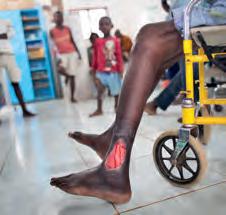
awareness activities. Patients were provided with laboratory diagnosis, antibiotics, wound dressing, surgery and physiotherapy at the Buruli ulcer ‘pavilion’ run by Médecins Sans Frontières.
In June, Médecins Sans Frontières handed over the Buruli ulcer pavilion to the Ministry of Health. The University Hospital of Geneva, Switzerland, will continue training Cameroonian medical students in chronic wound treatment and care, including for Buruli ulcer.
NAME: Rachel Marsden
FROM: Sydney, NSW
FIELD ROLE: Field Coordinator, Garoua-Boulai, Cameroon, June to October 2014.
The project I’m working on is very large, with 255 national staff, 14 international staff and three different medical intervention sites – much larger than anything I have been in charge of before.
We have two outpatient departments serving the 27,000 refugees – one in the Gado refugee camp, and one in the town. The main medical conditions are respiratory infections, malaria, diarrhoea and malnutrition and we average 3,000 consultations a week between the two sites. We have mental health services, prenatal care and referral capacity to secondary health structures; an ambulatory malnutrition centre that treats 800 patients a week, and an inpatient facility of 80 beds (all full), and a therapeutic feeding centre with 100 beds (also full)... so it’s a big machine!
As coordinator I have a lot of responsibility, which at times can be overwhelming. My days are spent collaborating with my teams to ensure the continuation of the activities, briefing new staff, overseeing the budget, dealing with the media, managing the human resources, attending
FIELD STAFF: 277
meetings with other organisations, collaborating with the Ministry of Health, but most importantly ensuring my team’s security and our humanitarian space.
This is a far cry from my role as nurse with Médecins Sans Frontières, which I did for five years, but I am loving the experience and the new challenges – to say ‘there is never a dull day’ would be an understatement!
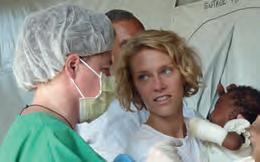 Regions where MSF has projects Cities, towns or villages where MSF works
AKONOLINGA
Rachel Marsden on assignment with Médecins Sans Frontières. © Rachel Marsden
Regions where MSF has projects Cities, towns or villages where MSF works
AKONOLINGA
Rachel Marsden on assignment with Médecins Sans Frontières. © Rachel Marsden
KEY ACTIVITIES:
Emergency healthcare, malaria, malnutrition, maternal healthcare, paediatrics, response to sexual violence, surgery
FUNDING: $7,145,000
CAR has been in chaos since December 2013 when the Séléka, a predominantly Muslim rebel coalition group, staged a coup that resulted in atrocities against the non-Muslim civilian population. The “anti-balaka”, a majority Christian militia group, attacked Muslims in reprisal and in the space of a few months the conflict degenerated into an exceptionally violent civil war, killing nearly 5,000 people, wounding tens of thousands and displacing more than 800,000 Central Africans. More than 90 per cent of the Muslims lived in the west of the country fled to Chad, Cameroon and the Democratic Republic of Congo to escape the violence. Access to care is limited and expensive, and there are shortages of skilled staff and drug supplies. Médecins Sans Frontières remains the main healthcare provider in CAR, but has been directly affected by the violence. Three national staff members were among 19 unarmed civilians killed by armed men at the Médecins Sans Frontières hospital in Boguila in April (for more details on this project see the International Activity Report).
In Bangui, the capital city, Médecins Sans Frontières provides emergency surgery at the general hospital for victims of violence and trauma such as road accidents. In addition to surgery, injured people receive physiotherapy and mental health care. Médecins Sans Frontières also provides medical and psychological care for survivors of sexual violence. In 2014, more than 5,000 patients were seen in the emergency department, of which 37 per cent related to violence. A total of 4,600 surgeries were conducted.
In December 2013, Médecins Sans Frontières began providing primary health care and treatment of the wounded at Mamadou M’Baiki health centre in Bangui’s PK5 district. As health centre staff began returning in July, Médecins Sans Frontières focused on providing basic healthcare to children under 15. Mobile clinics visited displaced people several times a week at a local mosque and church. More than 39,900 consultations were carried out in the PK5 neighbourhood in 2014, nearly a third of them malaria-related.
Paoua
Since 2006, Médecins Sans Frontières has worked in Paoua hospital in the country’s west, and now provides outpatient services, paediatrics, surgery, maternal healthcare and treatment for HIV and tuberculosis (TB). Médecins Sans Frontières also supports a series of health posts in the surrounding area, and a referral network to transport people to the hospital. In 2014, more than 71,000 consultations were held, 2,200 surgical procedures were conducted and 1,300 malnourished children were treated.
In Carnot, also in the west, Médecins Sans Frontières provided a comprehensive package of healthcare including paediatric care, routine immunisations and HIV and TB treatment. More than 49,000 consultations were held during the year, most of which were for malaria. More than 4,400 consultations were provided through a regular mobile clinic at a church in Carnot where 500 Muslims had taken refuge.
Projects funded by Australian donors
FIELD STAFF: 2,593
In Bria, towards the east of the country, Médecins Sans Frontières provided comprehensive healthcare to children under 15, including for malaria, TB, HIV and in response to sexual violence. More than 48,000 consultations were provided in the hospital in 2014, of which two-thirds were related to malaria. An average of 80 children were admitted to hospital each week.
In January, Médecins Sans Frontières began activities at Berbérati regional university hospital, responding to the needs of displaced people, victims of violence, pregnant women and children. Weekly mobile clinics visited some 350 people in the area, and outreach teams supported seven health centres in surrounding villages. Malnutrition, malaria, diarrhoea, respiratory tract infections and measles were the main health concerns. More than 41,900 outpatient consultations and 3,000 surgical interventions were performed. Médecins Sans Frontières also launched an intervention from Berbérati to Nola, where 23,000 children were vaccinated against measles.
Between January and April, at the height of the conflict, Médecins Sans Frontières intervened temporarily in Bouar. Teams carried out more than 240 surgical operations and treated 1,600 people in the emergency room. Médecins Sans Frontières also provided consultations to 8,500 Muslim refugees in the Bouar mosque.
The health situation in Central African Republic (CAR) is catastrophic, and conflict and displacement prevent people from obtaining the medical services they desperately need.CAR B BERBERATI BOUAR CARNOT PAOUA BRIA ANGUI Regions where MSF has projects Cities, towns or villages where MSF works
KEY ACTIVITIES: Malaria, nutrition, response to epidemics, vaccinations
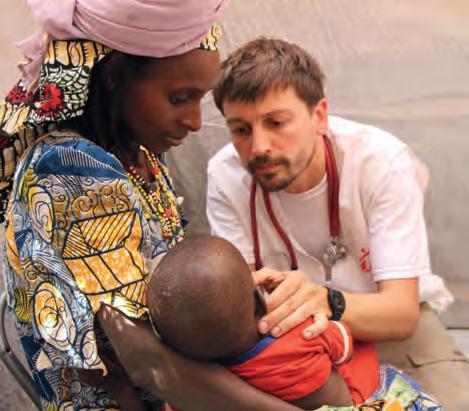
FUNDING: $3,400,000
FIELD STAFF: 1,032
Access to basic healthcare is limited in Chad, where malnutrition, malaria and outbreaks of disease are common. An influx of refugees from Central African Republic (CAR) in 2014 increased the need for medical aid.
Since December 2013, more than 200,000 people fleeing violence in CAR have sought refuge in southern Chad. In January Médecins Sans Frontières started providing health assistance, with projects in Bitoye until April, Goré until October and in Sido, which hosted the largest concentration of refugees (17,000). Altogether, teams carried out more than 35,000 consultations, mainly for malaria.
Malaria is the main cause of death for children under five in Chad, and is especially prevalent during the peak season from July to October. From May to October, Médecins Sans Frontières ran mobile clinics in three villages near Goré on the CAR border. Some 60 per cent of consultations in this area were for malaria. Médecins Sans Frontières also uses seasonal malaria chemoprevention – the distribution of antimalarials as a prevention strategy. More than 1,300 children under five were protected by this strategy in this area.
In Moissala hospital’s malaria unit, Médecins Sans Frontières teams focus on the treatment of the most severely affected children. Médecins Sans Frontières also provide support to health centres and community health workers in the districts of Moissala and Bouna. More than 68,000 cases of malaria were treated as outpatients and almost 2,000 were admitted to hospital during 2014. More than 68,000 children and pregnant women benefited from seasonal malaria chemoprevention during the peak malaria season in this region. In addition, routine vaccinations were administered to more than 27,200 children.
Médecins Sans Frontières manages the paediatric emergency department at Massakory hospital, in the Hadjer Lamis region, as well as the infant malnutrition program. In 2014, a total of 2,600 children and adolescents under the age of 15 were admitted for treatment at the hospital and the nutritional rehabilitation centre. In addition, nearly 4,000 children received outpatient treatment.
At the end of January, measles broke out across Chad. Teams supported the health ministry with a measles vaccination campaign for children aged six months to 10 years in Goré and surrounding areas, immunising around 7,000 children. The Massakory teams treated 245 patients and launched a vaccination campaign, immunising 69,700 children under the age of five. In Mandelia district, Médecins Sans Frontières vaccinated more than 62,000 children, as well as providing support to health facilities in case management and epidemiological surveillance. From the end of March, Médecins Sans Frontières also provided intensive support to several hospitals and health centres in the capital, N’Djamena, and treated 4,300 patients with measles.
MOISSALA MASSAKORY Project locations funded by Australian donors A consultation in Bitoye, Chad, near the Central African Republic and Cameroon borders. © Samantha Maurin /MSF Médecins Sans FrontièresKEY ACTIVITIES:
Tuberculosis
FUNDING: $400,000
Project locations funded by Australian donors
Médecins Sans Frontières’ tuberculosis (TB) project in Buenaventura was closed at the end of 2014.
Since 2010, Médecins Sans Frontières has run a TB project in Buenaventura, a port city in western Colombia. A total of 147 patients have been treated for drug-sensitive and drug-resistant TB in Médecins Sans Frontières-supported facilities since the project’s launch. Médecins Sans Frontières
also supported the national TB strategy in terms of diagnosis and treatment. Some aspects of the program have now been transferred to the Municipal Program of TB Control and the Social Company of the State.
NAME: Elizabeth Campbell
FROM: Gold Coast, Queensland
FIELD ROLE: Nursing Activity
Manager in Cheung
Prey, Cambodia, April 2014 to April 2015
I spent a year working to diagnose and treat people with TB in a region of Cambodia with a population of almost 200,000. We worked with the local Ministry of Health to make sure that people with TB were diagnosed, seen by a doctor, and that their treatment was completed. This treatment would take a minimum of six months.
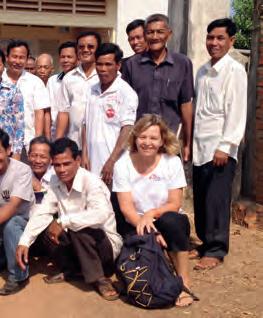
I remember one 23-year-old lady with TB who had previously been misdiagnosed, which had left her severely emaciated and with horrific abdominal wounds. She started a year-long course of TB treatment, which stabilised her and allowed her to return to live at home with her family. Her mother attended to all her wound care, often several times a day, and with limited resources. Throughout her treatment, the woman managed to gain eight kilograms – which was almost a third of her initial weight. When I completed my year in Cambodia, Médecins Sans Frontières was preparing to refer her for corrective surgery of her abdominal wounds. I am hopeful she continues to improve.
FIELD STAFF: 139
Colombia BUENAVENTURA Regions where MSF has projects Cities, towns or villages where MSF works © Beth CampbellKEY ACTIVITIES:
Ebola, maternal healthcare, neonatal care
FUNDING: $419,000
Project locations funded by Australian donors
Women generally deliver their babies at home with traditional birth attendants and without effective emergency obstetric care when there are complications.
In 2014, Médecins Sans Frontières opened a mother and child health program in Katiola hospital, in collaboration with the Ministry of Health. The 90-bed facility serves as the sole referral hospital for the whole region but until recently had very limited capacity to provide emergency obstetric and neonatal care. Only women who could afford to be
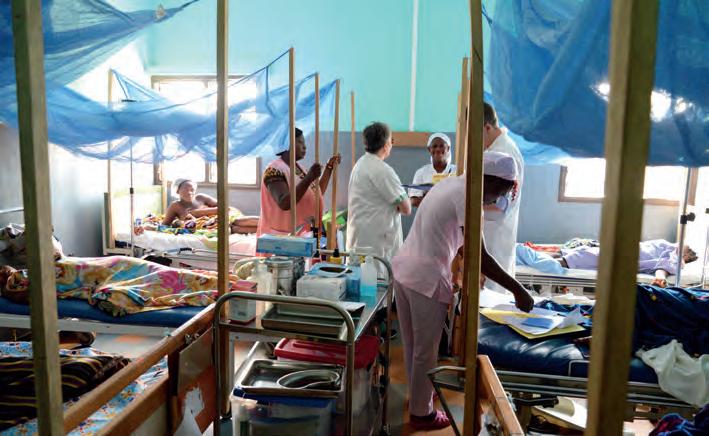
FIELD STAFF: 152
Frontières assisted with over 1,000 births, including 100 requiring caesarean sections.
Ebola
transported by ambulance were referred to the larger Bouaké hospital to get the necessary medical assistance.
Médecins Sans Frontières renovated Katiola’s maternity unit and the two operating theatres, built a water supply and sewage network in the hospital, and organised training for midwives. Médecins Sans Frontières took on management of emergency obstetric care, complicated deliveries and neonatal emergencies.
Between July and December, Médecins Sans
As a consequence of the Ebola outbreak, the borders with Liberia and Guinea were closed in August. No suspected cases were reported in Côte d’Ivoire, but Médecins Sans Frontières collaborated with the health authorities to build an Ebola management centre in Yopougon hospital in Abidjan as a contingency plan. Médecins Sans Frontières also supported the training of health staff and rapid investigation teams.
katiola aBiDJaN Cities, towns or villages where MSF works The maternity ward in Katiola hospital. © Jean-Christophe Nougaret/MSF Médecins Sans Frontières AustraliaKEY ACTIVITIES: Supplies, training
FUNDING: $400,000
Project locations funded by Australian donors
FIELD STAFF: 3
Médecins Sans Frontières focused on providing medical training and medicine donations in 2014.
Health facilities are not regularly maintained in DPRK and they lack medical equipment and supplies. The population is also affected by food shortages. Only a handful of international NGOs are permitted to work in the country, and their activities are closely controlled.
In June 2014, Médecins Sans Frontières completed a project in Anju district, South Pyongan province, aimed at increasing the capacity of medical services, primarily through staff training and donations of medicine and supplies. Médecins Sans
Frontières focused on mother and child healthcare, including specific training on management of diarrhoea, respiratory and neurological diseases, malnutrition among children, and life-saving obstetric procedures. As well as training medical personnel, the Médecins Sans Frontières team visited the paediatric and maternity wards of the local hospital, examining patients and assessing the implementation of training modules. Médecins Sans Frontières also supplied the medical equipment and medicine related to
NAME: Malcolm Hugo
FROM: Adelaide, South Australia
FIELD ROLE: Mental Health Coordinator in Freetown, Sierra Leone, July to September 2014
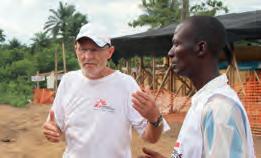
As a Mental Health Coordinator during the Ebola epidemic, I worked to respond to the mental health needs of patients, their families, staff and survivors. With the help of two local counsellors, I tried to meet all new patients to ensure they understood their diagnosis and the treatment process. I provided toys and activities for children, and facilitated religious services from local pastors. I organised body viewings and arranged funerals. I also spent a lot of time trying to find interim care for child survivors who had lost parents and other caregivers.
Staff, particularly the national nurses and hygienists, also required assistance to deal with their work. It was stressful for them having to sometimes deal with relatives as patients, feeling at high risk of catching Ebola and being stigmatised in their community for working in the Ebola management centre.
training topics, along with food for patients, caregivers and staff. Through the project Médecins Sans Frontières provided direct care for 250 patients and indirect support for 3,000 people.
At the end of October Médecins Sans Frontières began exploring the feasibility of activities in other locations. The team visited the county hospital in Sukchon in South Pyongan and Kim Man Yu hospital in Pyongyang and was negotiating with the government at year end to launch further programs. In December, two Ministry of Health staff were invited by Médecins Sans Frontières to attend an Ebola training session offered in Geneva.
For many patients, the experience in the Ebola centre was very traumatic. They had witnessed death and a lot of suffering. I followed up several survivors and found evidence of post trauma problems. Although discharge is a time for celebration, it is also the time when people begin to process the loss of family and may experience stigma and loss of income on returning home.
FUNDING:
FIELD STAFF:
Successive wars in the Democratic Republic of Congo have had a severe impact on health care.
Violence, fear and displacement continued in the Democratic Republic of Congo in 2014, while outbreaks of disease also affected the country. Médecins Sans Frontières works closely with the health ministry to provide comprehensive healthcare in some of the country’s most remote areas, where people cannot obtain or afford the medical care they need.
Four Congolese Médecins Sans Frontières staff members were abducted in 2013 in North Kivu. In 2014, one of them, Chantal, was reunited with her family. Efforts are ongoing to locate Philippe, Richard and Romy.
Cholera is endemic in the city of Kalemie, Katanga province. Since 2011, Médecins Sans Frontières has worked with partners to develop strategies to prevent recurrent outbreaks. In 2014, these included improving water supply, distributing more than 2,500 residential water filters in Kataki health area and vaccinating 51,400 people against the disease in July. Some 700 people received treatment from Médecins Sans Frontières during a cholera outbreak in July and August.
Médecins Sans Frontières ran a malaria project in Kabalo, north-central Katanga, from 2012. The project was closed in June 2014. In the first six months of the year, more than 36,000 children aged under five were supported as outpatients and 1,700 were hospitalised. Over the same period, 1,600 malnourished children received treatment.
In Kongolo, Médecins Sans Frontières treated more than 12,300 children under five for malaria and admitted over 1,350 children with severe or complicated malaria to Kongolo hospital between March and June. Teams also worked at six health centres, treating respiratory and parasitic infections and diarrhoeal diseases. In the provincial capital Lubumbashi, Médecins Sans Frontières responded to a spike in measles cases by providing clinical care in two health facilities. Following a cholera outbreak in the city, Médecins Sans Frontières distributed water, disinfected family homes and rehabilitated wells.
The Médecins Sans Frontières -supported 300-bed general reference hospital in Rutshuru remains the only place where the local population and displaced people can
obtain specialist healthcare in Rutshuru territory. More than 28,800 patients were admitted this year, a 31 per cent increase over 2013. More than 8,000 surgeries were performed, and 4,500 babies were delivered in the hospital in 2014. The hospital also cared for more than 400 survivors of sexual violence.
Since late 2012, Médecins Sans Frontières has provided healthcare in Mugunga III camp, Goma, to displaced people fleeing fighting in Rutshuru and Masisi. As the security situation stabilised and people began returning home, Médecins Sans Frontières decided to withdraw. More than 21,100 consultations were provided between January and July 2014.
In Birambizo health zone, Médecins Sans Frontières supported paediatric care in Kabizo health centre until May, and helped bring a cholera outbreak under control in July in Kibirizi.
In Dingila, a town in Bas Uélé district, Médecins Sans Frontières closed its project focusing on the screening and treatment of human African trypanosomiasis, also known as sleeping sickness. This decision was based on the significant decrease in the number of new cases, and many of the areas in the Dingila, Zobia and south Ango region previously identified as high prevalence zones had been screened two or three times. In 2014, our teams screened 30,747 people, and found 78 cases of sleeping sickness.
In the first six months of the year, more than 36,000 children aged under five were supported as outpatients and 1,700 were hospitalised.
KEY ACTIVITIES:
Malaria, maternal healthcare, nutrition, primary healthcare, response to epidemics, vaccinations
FUNDING: $527,767
Project locations funded by Australian donors
Some 200,000 refugees from the civil war in South Sudan arrived in Gambella region, western Ethiopia, between December 2013 and October 2014.
The long journey on foot, with inadequate food and water, took a toll on people’s health and many arrived in Ethiopia sick and malnourished. From February, Médecins Sans Frontières provided medical consultations and care at entry points close to the border. Teams worked at a health post in Pagak and Tiergol, ran mobile clinics in Pamdong and Burbiey, and conducted outpatient consultations at a health post in the Matar transit camps.
Leitchuor
Médecins Sans Frontières also started a program in Leitchuor camp. The 100-bed hospital offered outpatient consultations, emergency services, maternal healthcare and treatment for malnutrition. Outreach workers provided health promotion activities and identified people needing medical attention. The camp is located in an area prone to flooding and was inundated during the rainy season, causing the eventual relocation of the refugees to other
camps in nearby villages and on higher ground. Teams provided almost 35,000 consultations in 2014, mainly for malaria. Nearly 2,000 patients were hospitalised, mostly for respiratory infections.
Médecins Sans Frontières ran inpatient and outpatient services for refugees and the host population in Itang, close to Kule and Tierkidi camps, where more than 100,000 people had settled by April. The 118-bed health centre provided intensive care, a therapeutic feeding centre, an isolation unit for infectious diseases and emergency care for critical cases.
Following a cholera outbreak in South Sudan and Ethiopia, Médecins Sans Frontières launched a preventative vaccination campaign in Gambella region in July, targeting 155,000 refugees and members of the host community who
FIELD STAFF: 1,416
received two doses of the vaccine. An epidemiological survey conducted in September revealed an overall coverage of 90 per cent.
Respiratory infections were the leading cause of hospitalisations in the early part of the year. In November, Médecins Sans Frontières launched a vaccination campaign against pneumococcal disease and Haemophilus influenzae type B, the two main causes of respiratory infections in children. In November, some 23,000 children aged six weeks to five years were immunised.
North of Gambella, thousands of people fled to the Benishanghul-Gumuz region of Ethiopia in 2011 and 2012. Médecins Sans Frontières has provided primary health care and nutrition services in the region since June 2012. This project was handed over to the Ethiopian refugee agency in April 2014.
Despite floods in late August, teams maintained their activities and provided more than 11,600 consultations. Approximately 1,200 patients were hospitalised.Projects funded by Australian donors
KEY ACTIVITIES: Ebola FUNDING: $239,830
Project locations funded by Australian donors
Although the epidemic spread rapidly in Guinea, reaching the capital Conakry on 31 March, the country did not experience the same exponential increase in cases as recorded in Liberia and Sierra Leone. However, more than one year after the outbreak was declared, new cases continue to be recorded each week in Guinea.
Médecins Sans Frontières led the early response to the epidemic, opening Ebola
management centres in Guéckédou, Conakry (the capital) and Telimele. These projects were funded by other sections (see the International Activity Report for full details).
Médecins Sans Frontières France began construction of a 40-bed Ebola management centre in Kankan, the country’s second largest city, in December. Prior to its opening, teams supported staff at the
NAME: Kamalini Lokuge
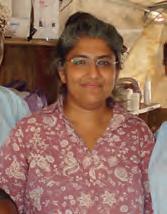
FROM: Canberra, ACT
FIELD ROLE: Medical Epidemiologist in Guinea, March to May 2014; and Sierra Leone, October to December 2014.
I work with our patients, their families and communities, with our staff and others involved in the response to understand how patients may have become infected with Ebola, and in turn who they may have passed the infection on to. This information helps us understand what we need to do to stop the spread of disease. There are always many challenges but the most rewarding part, as in every mission, is working with my MSF colleagues, our patients and their communities.
FIELD STAFF: 545
regional hospital, strengthening infection control and hygiene practices, and helping transfer Ebola patients for treatment.
Médecins Sans Frontières also provided support to the wider health system in the region, supporting case detection, improving screening capacity and triage protocols, supporting patient referrals and raising awareness of the disease among the general population and caregivers.
Port-au-Prince
Projects funded by Australian donors
KEY ACTIVITIES: burns care, maternal care, neonatal care, surgery
FUNDING: $5,350,000
Project locations funded by Australian donors
Five years after Haiti’s massive earthquake, the health system is only partially reconstructed and specialist services remain out of reach for many people.
Haitians need better access to emergency services, including obstetrics, neonatology, surgery and trauma care.
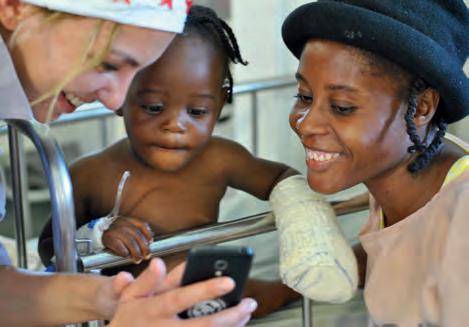
Léôgane
Following the January 2010 earthquake, Médecins Sans Frontières constructed a temporary container hospital to conduct surgery in Léôgane, an area that was 80 per cent destroyed by the disaster. The Chatuley hospital now also manages emergencies, focusing mainly on complications in pregnancy and road accident victims. Basic medical care is also provided to pregnant women as well as children under five.
In keeping with the plan to close the hospital in 2015, Médecins Sans Frontières has been progressively reducing activities at Chatuley since 2013. In February, a cholera treatment unit that had been running since 2010 was closed. As of November, only emergency services for pregnant women, newborn babies and children under five were being provided. Teams have been reinforcing the capacity of other medical facilities in the area in preparation for the closure. In 2014, Médecins Sans Frontières admitted 6,782 patients to Chatuley hospital, carried out
2,617 consultations for children under five, provided 6,162 antenatal consultations and assisted 3,298 births.
FIELD STAFF: 2,159
Drouillard
Domestic accidents and poor living conditions are the main cause of burns in Haiti, and victims are predominantly women and children. Médecins Sans Frontières continued to run the only facility treating burns patients in the country, in Drouillard hospital, Port-au-Prince. Equipped with three operating theatres, the hospital increased capacity from 30 to 35 beds. There were 481 patients hospitalised for burns in 2014.
Cities, towns or villages where MSF works Haiti Léogâne A young burns patient in Drouillard hospital, Haiti. © Clara Nordon/MSFIn 2014, Médecins Sans Frontières admitted 6,782 patients to Chatuley hospital, carried out 2,617 consultations for children under five, provided 6,162 antenatal consultations and assisted 3,298 births.
KEY ACTIVITIES: Maternal healthcare, mental healthcare, neonatal care, paediatrics, primary healthcare
FUNDING: $4,749,900*
Project locations funded by Australian donors
A rapid escalation in conflict in Iraq caused massive internal displacement in 2014. Nearly two million people have fled their homes in search of safety.
Continual fighting hampered the delivery of humanitarian assistance to displaced people in northern and central Iraq. Médecins Sans Frontières launched emergency interventions and found that most of the health problems were related to poor sanitary conditions, particularly the lack of latrines and clean water.
Kirkuk
Médecins Sans Frontières has constantly adapted to the evolving situation to provide essential services to the displaced. As security conditions deteriorated in June 2014, Médecins Sans Frontières suspended its support program for Hawijah hospital and instead started to provide medical support and distribute emergency aid in Kirkuk, Dohuk, Al Anbar and Baghdad governorates.
Aid is mainly provided from mobile clinics, comprised of doctors, nurses and mental healthcare specialists, who move around the region. In addition to primary healthcare, there is a particular focus on reproductive health, paediatrics and treatment of chronic illnesses such as diabetes.
FIELD STAFF: 627
*Note: This is combined funding for Iraq and Jordan
healthcare to six locations. Twenty thousand blankets and 2,200 hygiene kits were distributed to displaced families. Médecins Sans Frontières has worked in the city since 2010, but is the only international organisation present. Several times during the year, Médecins Sans Frontières called for other aid organisations to strengthen their presence in areas of Iraq where the most vulnerable displaced people can be reached, including Kirkuk. In February 2014, Médecins Sans Frontières handed over support of the neonatal service at the general hospital to the Ministry of Health and, following escalating violence in June, re-directed activities to respond to the most urgent medical needs.
Erbil
In Kirkuk city, Médecins Sans Frontières operates mobile clinics which provide
Sheima, 19, a mother of two, received care for her baby in the Médecins Sans Frontières clinic in Bharka Camp, Iraq.
“I am from Mosul and when we fled in June I was heavily pregnant. We first moved to Qaraqosh and I gave birth there. Then we stayed for a few weeks in Bartala but the insurgents took over that city as well and we had to run again. We decided to come to Kurdistan hoping to find somewhere safe to settle, so my husband drove all the way to Erbil. But once we got here we had nowhere to go and were told to come to the camp. There was nothing ready when we arrived, just an abandoned warehouse with only a roof. Now some partitioning has been put in and tents have gone up, but I worry that the conditions are not good. The water is not clean and we often have power cuts.
I’m here to see a doctor because my baby, who is only 26 days old, was not breathing well all night and I am very worried. I was told by some neighbours that there was a clinic providing a good service. Most of the people here are from Mosul – both Shia and Sunni. We cannot go back, it’s not safe. My only wish is to go home.”
More than 200,000 Syrian refugees live in Iraqi Kurdistan, many in Erbil governorate. Médecins Sans Frontières was the main provider of basic healthcare to Syrians in Darashakran and Kawargosk refugee camps in Erbil, until activities could be handed over to the International Medical Corps towards the end of the year. Médecins Sans Frontières
Twenty thousand blankets and 2,200 hygiene kits were distributed to displaced families.KIRKUK ERBIL Regions where MSF has projects Cities, towns or villages where MSF works Médecins Sans Frontières Australia
carried out more than 64,000 outpatient consultations during the year. Médecins Sans Frontières remains responsible for providing mental health support in these camps and the team carried out more than 1,100 consultations during the year.
The Islamic State group and allies launched major offensives in Samarra and Mosul in June. Médecins Sans Frontières responded by launching emergency interventions to provide basic medical care and relief for displaced families. Mobile clinics reached displaced people in several locations between Mosul and Erbil between June and August.
Many victims of war are unable to access reconstructive surgery in Iraq because of the cost and the security situation, and post-operative care such as physiotherapy is lacking. Médecins Sans Frontières offers wounded Iraqis reconstructive surgery, psychosocial support and physiotherapy through its project in Amman, Jordan (see Jordan section for more details). A network of eight medical liaison officers refers patients, and more than 150 Iraqi victims of violence needing these specialist services were referred in 2014.
NAME: Steven Denshire
FROM: Newcastle, NSW
FIELD ROLE: Logistics Manager, Dohuk, Iraq, July to December 2014
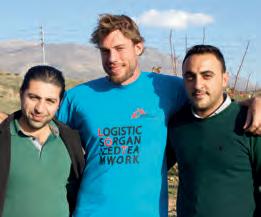
When I first arrived in Dohuk, there were already 60,000 or 70,000 Syrian refugees in the camp. We were the main healthcare provider, and we were running a primary healthcare clinic and a maternity unit. It was a really big operation, but by August, the conflict in Iraq and Syria had ramped up, and displaced people were flooding in. It became obvious that Médecins Sans Frontières would also need to do an emergency intervention in Dohuk. I found myself being asked to step up to the plate, basically doubling the size of our mission.
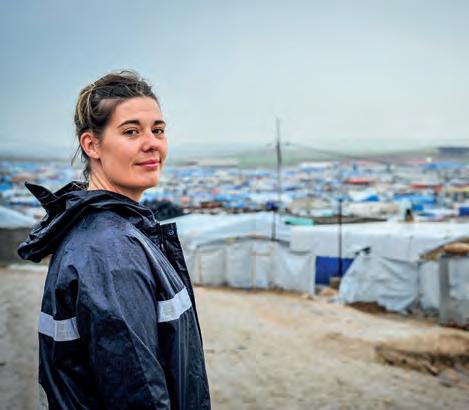
In a context like that, very simple illnesses can become life-threatening very quickly. We were running mobile clinics all over the area, treating displaced people for things like diarrhoea, chest infections, skin diseases, and so on. We built about 100 toilets and 50 showers, and did other water and sanitation activities to try to prevent any disease outbreaks. If anyone had more serious illnesses, we’d refer them to the local hospital.
My background is in building, and this was my first sort of ‘office job’ ever. I have to say it was the most stressful experience of my life. In a situation like that, you’re
constantly aware that a lack of results could mean a loss of life. Fortunately, I was working with a team of loyal, hard-working national staff, who really knew what they were doing. Lots of them were refugees or internally displaced people themselves, which was great because they knew the communities we were working with, and were really respected by everyone.
Steve Denshire with national Médecins Sans Frontières staff in Iraq © Steve Denshire Australian nurse Jessica Lovel in front of the Domeez refugee camp. © Gabrielle Klein/MSFKEY ACTIVITIES: Mental health, neonatal care, obstetrics, paediatrics, surgery
FUNDING: $4,749,900*
Project locations funded by Australian donors
More than 600,000 Syrians fleeing war have sought safety in Jordan, mainly in urban areas, and the need for basic services such as healthcare has vastly increased.
Irbid
Médecins Sans Frontières runs a maternity hospital in Irbid, northern Jordan, providing free healthcare to help meet the needs of a large number of Syrian refugees and vulnerable Jordanians. Antenatal and postnatal outpatient consultations and basic emergency obstetric and neonatal care are available. Over 2,000 births were assisted in 2014. Médecins Sans Frontières extended services by opening a paediatric outpatient department in January, which conducted nearly 14,000 consultations over the year. In October, Médecins Sans Frontières
launched a mental health program for children showing signs of distress from war and displacement, which provided 350 consultations by the end of the year. A team also started a pilot project in mid-December, offering free medical care to Syrian refugees and underprivileged Jordanians with chronic diseases, mostly diabetes and hypertension, at a government clinic in Irbid. The aim is to ease the demand on local medical resources.
Ahmed’s nine-year-old son and a friend were injured while playing with something they found: unexploded ordnance. Ahmed brought his son to Ar Ramtha for emergency treatment.
“In Daraa they told me they could not treat the kind of injuries my son had. They did not have the right kind of equipment, and there was only one doctor. We were lucky. It only took 15 minutes to get to the border and we managed to get to the hospital within 25 minutes. His whole body was full of shrapnel; the largest injuries were on his leg. So far he has had seven surgeries, and we hope that his treatment is nearly finished.”
FIELD STAFF: 209
*Note: This is combined funding for Iraq and Jordan
Amman
Médecins Sans Frontières’ reconstructive surgery program in Amman provides a critical service for victims – many of them children – of conflict in Syria, Iraq and Yemen. Patients are referred through a network of doctors in the region and surgeons carry out orthopaedic, maxillofacial and plastic reconstructive surgery free of charge to help patients recover from devastating injuries. The team performed 1,369 surgical procedures in 2014, and Syrians accounted for 45 per cent of all admissions. An outpatient department also provides consultations for Syrians who have undergone operations elsewhere and need post-operative care. Mental health professionals ran a total of 8,000 sessions with patients in this project.
AMMAN Cities, towns or villages where MSF works IRBIDProjects funded by Australian donors

KEY ACTIVITIES: HIV/AIDS, maternal healthcare primary healthcare, response to sexual violence, surgery, tuberculosis
FUNDING: $4,000,000
Project locations funded by Australian donors
Médecins Sans Frontières responds to the health needs of Kenya’s most vulnerable people – refugees, people with HIV/AIDS, victims of sexual violence, and those who live in Nairobi’s slums.
Dadaab
Over 350,000 people, mostly Somalis, live in precarious conditions in Dadaab, the world’s largest long-term refugee settlement. For security reasons, Médecins Sans Frontières can no longer guarantee a permanent presence of international staff in Dadaab, so experienced national staff manage a 100-bed hospital and four health centres in Dagahaley, one of the five Dadaab camps. There were more than 1,000 admissions on average each month to the hospital and the intensive therapeutic feeding centre, in addition to 16,000 outpatient and mental health consultations monthly. The hospital provides general medical treatment and emergency surgery, as well as obstetrics and gynaecology, neonatal and paediatric services. Médecins Sans Frontières also provides refuges with treatment for HIV/
AIDS and tuberculosis (TB). In 2013, Médecins Sans Frontières set up a palliative treatment program to help alleviate end-oflife suffering. This program has now evolved to also provide home-based treatment to patients with chronic illnesses.
Nairobi
In the slums of Nairobi’s Eastlands, poverty, marginalisation and drug addiction give rise to enormous levels of violence, particularly sexual and gender-based violence. Survivors of violence, however, have very limited access to emergency medical care in this part of the city. Médecins Sans Frontières has been working to fill this gap with its program at the Lavender House clinic in Mathare, which offers comprehensive care to victims of sexual and gender-based violence, including access to a 24-hour
FIELD STAFF: 603
hotline and ambulance. Patients receive medical consultations, treatment to prevent transmission of HIV and sexually transmitted infections, a pregnancy test when relevant, swabs for legal purposes, psychological counselling, and referrals for social and legal support. In 2014, more than 200 patients received aftercare each month; half of these were minors, and one quarter were under the age of 12. A trauma room at Lavender House was also established to manage ambulant medical emergencies, and stabilise and refer patients to other facilities when needed. Some 300 patients received care in the trauma room each month, the majority for physical assault.
After evaluating the health needs in the area, Médecins Sans Frontières decided to address the population’s lack of access to hospitals and specialist healthcare. A dispatch centre was set up and two ambulances were made available to the residents of Mathare and Eastleigh. During the first six weeks of the project, 141 calls were received. Médecins Sans Frontières also started supporting the
Laventa, aged 19, is married and lives in Kibera, a slum area in Nairobi.
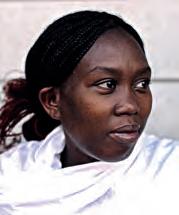
“At 14, I got pregnant with my first child who is now six years old. I got pregnant with my second child in June 2014. After many years, my husband and I wanted another child. After my delivery, I will adopt a family planning method so that I can raise my two kids. If my husband asks me to get pregnant again, I will advise him to wait until our baby is two or three years old. I will tell him it is important to space the children because of the economic impact of having more kids and also because it will allow us to have healthy children.
© Chris Peken/ MSFI have received some useful information since I started visiting the Médecins Sans Frontières clinic. I have learnt how to protect myself, how to raise healthy kids, the importance of hygiene and the need for a balanced diet. We are also taught about family planning and the services here are of good quality and the treatment and delivery are free of charge.”
HOMA BAY NAIROBI DADAABaccident and emergency department of Mama Lucy Kibaki hospital – the only hospital accessible for Eastlands’s two million residents – with additional staff, equipment, training and supervision. A program that focuses on detection and treatment of people with drug-resistant tuberculosis continued at the Green House, Mathare, in response to the lack of diagnostic capabilities for TB in the country. Médecins Sans Frontières started the first patient diagnosed with extensively drugresistant TB on a regimen that includes the new anti-TB drug bedaquiline.
Médecins Sans Frontières continued to provide antiretroviral treatment for HIV and treatment for TB in Homa Bay. In September 2014, 7,400 people were receiving ARV treatment in the project, while 100 new cases of TB were diagnosed during the year. Médecins Sans Frontières also opened a new project in Ndhiwa in the same region to reduce the number of new HIV infections and reduce mortality. The project aims to promote preventive measures, prevent mother-to-child transmission of HIV, and monitor and observe patients’ long-term treatment.
NAME:
Paul Yarnall
FROM:
Hobart, Tasmania
FIELD ROLE:
Logistics Manager, Ndhiwa Kenya, July 2014 to January 2015
The prevalence of HIV in Ndhiwa in 2012 is astronomically high. Médecins Sans Frontières is working closely with the Ministry of Health, with the overall aim of reducing the rate of new infections and increasing the diagnostic capabilities and quality of care.
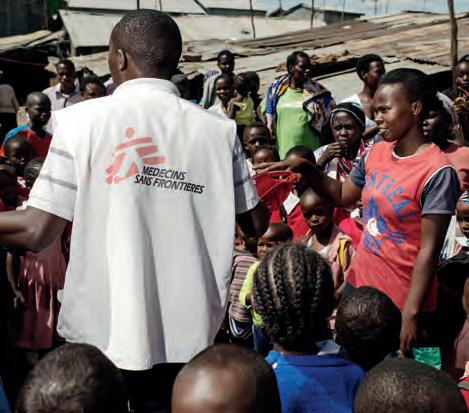
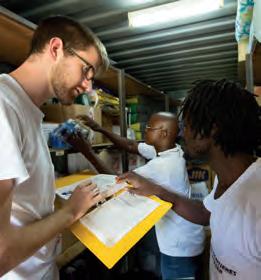
I was there at the start of the project, so a lot of my work involved identifying the needs. For instance we identified where we could put a bore hole so we could get running water to a maternity ward. We started construction to convert an old mortuary into a pharmacy, which was urgently needed. From my work in the theatre industry in Australia I had a lot of experience with drawing and computer aided design so I took measurements and drew up the construction designs. Along with my team we selected and briefed suppliers, and monitored the construction.
A massive part of my role was training local staff. The team I had in Kenya was incredibly competent. I was still across everything but the more I could delegate to the local staff so they could develop their skills, the
better off we all were. Because one day Médecins Sans Frontières will leave, and it will be the local staff who will be there to maintain the work.
Paul Yarnall in Ndhiwa, Kenya. © Lou Cormack Médecins Sans Frontières staff went to different slums in Nairobi to perform music and theatre on the issue of gender-based violence. © Matthias SteinbachKEY ACTIVITIES:
Tuberculosis
FUNDING: $807,000
Project locations funded by Australian donors
Médecins Sans Frontières completed its prison-based tuberculosis (TB) project in Kyrgyzstan in 2014.
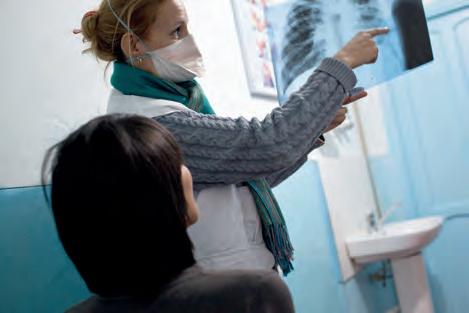
The incidence of TB among prisoners is estimated to be 20–30 times higher than in the general population in Kyrgyzstan. Since 2006, Médecins Sans Frontières has run a program providing TB diagnosis and treatment for inmates at a prison in Bishkek. Having established protocols and improved access to care, Médecins Sans Frontières handed over the project to the International Committee of the Red Cross, the health ministry and prison authorities in 2014.
More than 3,000 patients were enrolled and treated during the project’s eight years of operation. As well as providing direct TB care for prisoners, Médecins Sans Frontières also supported treatment for co-occurring illnesses, and provided follow-up treatment once people were released from prison. Médecins Sans Frontières also supported the construction of a national reference laboratory in Bishkek.
Shakir was previously treated for TB but had not been cured. He had MDR-TB. “While on treatment, I had no idea that I would need psychological help. But when you take the drugs, you get side effects. I became nervous and apathetic. The psychosocial support that I received from MSF during my entire treatment was tremendously helpful. After six months of outpatient treatment, the doctor came to my house with the results of my last sputum tests: ‘Shakirake, I have good news for you, the test results are great. You have been cured!’”
FIELD STAFF: 108
Regions where MSF has projects Cities, towns or villages where MSF works BISHKEKSAIDA
KEY ACTIVITIES: Mental healthcare, primary healthcare
FUNDING: $1,000,000
Project locations funded by Australian donors
Lebanon currently holds the world record for the most refugees per inhabitant. An estimated 1.2 million Syrian refugees, Palestinian refugees from Syria, and Lebanese returnees have sought refuge in Lebanon since the Syrian conflict began in 2011. Lebanon, a tiny country with a population of only four million, is struggling to cope.
Most of the Palestinian refugees live at the Ain al-Hilweh camp in Saida, which has an estimated population of 75,000. Médecins Sans Frontières’ project in Saida was launched in April 2011 to ensure free-ofcharge mental health care for Palestinian refugees and other residents of Ain alHilweh camp and surrounding areas.
Since the beginning of the project, Médecins Sans Frontières has continuously advocated for the integration of mental health services into the existing primary health care facilities run by the United Nations agency for Palestine refugees. In 2014, the Médecins Sans Frontières team of psychologists, social workers and community health workers delivered mental health services at the Human Call hospital and at two UN clinics inside the camp. Outside the camp the team worked at the Palestinian Red Crescent Society Hospital and Saida Governmental Hospital.
Médecins Sans Frontières also covered the hospitalisation costs for specific groups of mental health patients, and has taken a leading role in the community for training, capacity building and community empowerment in mental health. In Ain Al Hilweh camp, Médecins Sans Frontières provided more than 13,100 psychological and psychiatric consultations throughout 2014, which is almost twice the number of consultations provided in 2013.
FIELD STAFF: 284
Furthermore, Médecins Sans Frontières provides primary health care services at Human Call hospital responding to the increasing needs of refugees coming from Syria. Médecins Sans Frontières has also conducted health promotion activities and training sessions for medical staff. In order to respond to any potential influx of wounded during outbreaks, Médecins Sans Frontières set up emergency medical stocks in Ain al-Hilweh camp. From January to March 2014, a mobile clinic was also active in Ouzaii gathering and the old city of Saida mainly for Syrian refugees aiming at covering medical needs during the winter period.
Médecins Sans Frontières provided more than 13,100 psychological and psychiatric consultations throughout 2014, which is almost twice the number of consultations provided in 2013.
KEY ACTIVITIES: Ebola, malaria
FUNDING: $477,353
Project locations funded by Australian donors
On 31 March, the first cases of Ebola were confirmed in Liberia. By the end of July, the number of sick had risen to overwhelming numbers and people were dying in the streets.
Médecins Sans Frontières France focused on projects that responded to the collapse of the health system, particularly in the capital, Monrovia, but did not directly manage an Ebola management centre. For details of the Ebola management centres and other activities run by Médecins Sans Frontières in Liberia, see the International Activity Report. Malaria is endemic in Liberia, and has similar symptoms to early Ebola. People with malaria were often unable to receive
care because hospitals and health centres had closed due to the Ebola outbreak. Médecins Sans Frontières distributed antimalarial medications to 522,000 people in Monrovia, not only to protect them from the disease but also to reduce the number of patients presenting at Ebola Management Centres wrongly thinking they had Ebola. Two rounds of distribution took place in five districts (New Kru Town, Clara Town, Gardnersville, West Point and Logan Town) between late October and December.
NAME: Louise Johnston
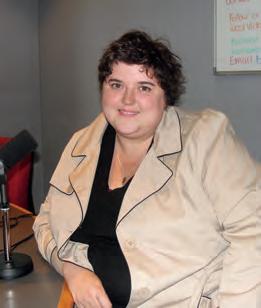
FROM: Ballarat, Victoria
FIELD ROLE: Health Promoter in Voinjama and Monrovia, Liberia, October to December 2014
I travelled to Liberia in October 2014 to work as a health promoter. This role involves a lot of education, information and communication. With Ebola, unless patient treatment goes hand-in-hand with educating the community, the epidemic will spiral out of control, which is precisely what we saw.
I had a team of Liberian staff, who were all from the areas we worked in and could deliver the information in a way that was culturally appropriate. They counselled people, and we used radio programs and religious leaders to spread the message. We also organised tours for community leaders to visit the treatment centre. Stigma around Ebola was a problem we encountered everywhere. We couldn’t even enter many villages, as seeing white cars and white people with chlorine sprays fed people’s fears that we were there to actually give them the disease.
It was immensely challenging and rewarding work. I will never forget the impact such an epidemic can have on an entire population, and feeling so powerless against it. But in the two months I was there, seeing a population
FIELD STAFF: 373
The low level of hygiene and infection control measures in healthcare facilities had the dual effect of exposing healthcare personnel to infection, and transforming healthcare structures into ‘amplification points’ that further spread the disease. Between October 2014 and March 2015, Médecins Sans Frontières provided support to 28 primary health centres in Greater Monrovia, through training, donating hygiene materials and establishing safe triage areas. From December, Médecins Sans Frontières also supported the Jefferson Davies Junior Hospital in terms of training, improving triage, hygiene and isolation, and donating medical supplies.
move from denial of the disease through to fear and acceptance was incredible.
MONROVIA Cities, towns or villages where MSF works © ABCKEY ACTIVITIES: HIV/AIDS FUNDING: $800,000
Project locations funded by Australian donors
Médecins Sans Frontières supports the national health system to strengthen its HIV response through staff training, technical support and implementing innovative treatment models.
Médecins Sans Frontières has worked in Chiradzulu district since 1997, and began treating HIV/AIDS patients with antiretrovirals (ARVs) in 2001. By September 2014, more than 30,000 HIV-positive people were receiving ARV treatment in the district.
In August 2014, Médecins Sans Frontières and the health authorities in Chiradzulu district began a four-year handover process
for the program. Médecins Sans Frontières continues to simplify HIV treatment, such as spacing out appointments for people with stable HIV. Since September, almost 50 per cent of people taking antiretrovirals
NAME: Daron Cunningham
FROM: Sunshine Coast, Queensland
FIELD ROLE:
Surgeon in Kunduz, Afghanistan, July and August 2014
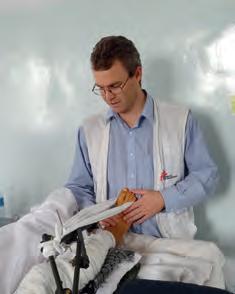
I was working as a surgeon in a trauma hospital in a region of Afghanistan that sees a lot of violence. The hospital was busy – really busy. There were a lot of very advanced cases, with complex injuries. I also worked as a surgeon-educator. The local surgeons were good, but their training was patchy, so there was plenty of teaching to do. There was a real feeling that everybody was working toward the same goal, and a ‘can do’ philosophy. There were many patients who made a big impact on me: the patients whose care goes better than expected and they survive or keep a limb when the odds were against them. The patients who suffer disabling injuries but are still grateful, because they know it would have been much worse without our care. The children who can still laugh and play in spite of their injuries. The children, who just shouldn’t have their arms or legs blown off, and just shouldn’t be there at all.
I find that each field placement confirms for me that all the training was worth it, and that being able to have a positive effect on the life of a stranger is a valuable reward for my efforts.
Projects funded by Australian donors
FIELD STAFF: 586
in Chiradzulu have been on a six-monthly appointment schedule, which reduces the patient load and waiting times in the health centres. In addition, Médecins Sans Frontières is implementing a UNITAID-funded project using point-of-care tests to measure CD4 count and viral loads in Chiradzulu. This allows samples to be tested on the spot, rather than sent away for testing. By the end of the year, five health centres were testing for CD4 and four were measuring viral load.
Dr Daron Cunningham in Afghanistan. Malawi CHIRADZULU Regions where MSF has projects Cities, towns or villages where MSF worksBy September 2014, more than 30,000 HIV-positive people were receiving ARV treatment in the district.
KEY ACTIVITIES: Ebola, malaria, maternal healthcare, paediatrics, primary care
FUNDING: $1,450,000
Project locations funded by Australian donors
Access to basic healthcare was severely restricted in parts of northern Mali in 2014, as the security situation deteriorated, Jihadist attacks continued against military targets and peace talks did not lead to an agreement.
Koutiala
Since 2009, Médecins Sans Frontières has been working in Koutiala, in the Sikasso region, which is characterised by high rates of childhood malnutrition and malaria. Médecins Sans Frontières continued to provide a comprehensive paediatric program in collaboration with the Ministry of Health. Médecins Sans Frontières supports the paediatric unit within Koutiala health centre, and basic healthcare in five district health areas.
In 2014, some 78,000 consultations were provided, including 37,000 for malaria, which is the leading cause of child mortality in the area. Médecins Sans Frontières also aims to prevent severe malaria through a seasonal malaria chemoprevention program that has been running in this area for three years. In 2014, 183,970 children benefited from this preventive approach. During the seasonal malaria peak, Médecins Sans Frontières doubled the number of beds to 400 in the paediatric unit. Teams also trained local paramedics and medical students. A pilot preventive paediatric care project, including vaccinations and bed net distribution, continued in the Konséguéla health area.
Timbuktu
The provision of health services in the capital, Timbuktu, is chaotic, and insecurity frequently hinders access to care. Mobile teams continued to support staff in five peripheral health centres offering primary care, vaccinations and malnutrition screening, but insecurity severely hampered supervision of these facilities in 2014 and hindered patient travel to Timbuktu.
Médecins Sans Frontières supported the 65-bed Timbuktu regional hospital, focusing on medical and surgical emergencies. There were on average 700 inpatient admissions
FIELD STAFF: 883
and 150 assisted deliveries every month. Patients received care for malnutrition and malaria, while pregnant women received antenatal care. Teams also provided consultations for patients with chronic illnesses at the Centre de Santé de Référence, to treat diseases such as diabetes or hypertension and combat complications.
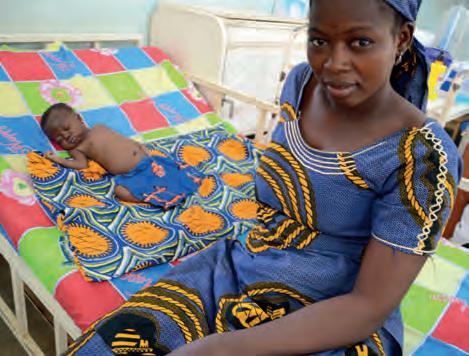
Following confirmed cases of Ebola in Mali in October, Médecins Sans Frontières set up an Ebola management centre in Koutiala, and provided staff training. In Yanfolila and Sélingué districts, Médecins Sans Frontières provided comprehensive Ebola training to 95 health workers, donated equipment and set up transit centres. Other Médecins Sans Frontières sections funded other Ebola projects in Mali (see the International Activity Report for more details).
A baby rests next to his mother in Koutiala, Mali. © Aurelie Baumel/MSFKEY ACTIVITIES: HIV/ AIDS, tuberculosis FUNDING: $1,500,000
FIELD STAFF: 370
Despite significant progress, Mozambique still has one of the highest rates of HIV/AIDS in the world.
Each year, HIV/AIDS causes more than 70,000 deaths and 100,000 new infections, and more than half of all HIV-positive patients do not have access to antiretroviral (ARV) treatment. At the end of June 2014, Médecins Sans Frontières was providing ARV treatment to 27,800 people, of whom 423 were children under five. In collaboration with local authorities, Médecins Sans Frontières has gradually stopped providing direct first-line medical treatment and is instead concentrating on expanding specialised
and adapted care for people with medical complications or co-infected with diseases such as multi-drug resistant tuberculosis (MDR-TB) or Kaposi’s sarcoma, a type of cancer that causes painful skin lesions.
Médecins Sans Frontières treated more than 2,440 HIV/AIDS patients with additional virus-related complications in the Alto-Maé referral centre in Maputo. Over 450 patients were treated for Kaposi’s sarcoma and 40 were treated for MDR-TB. In five health centres in the Chamanculo
district, Médecins Sans Frontières focused this year on early diagnosis of infantile TB. In Chamanculo hospital, Médecins Sans Frontières worked with local health authorities to prevent virus transmission between HIV-positive mothers and their children. All HIV-positive pregnant women now receive life-long ARV treatment.
In collaboration with the Ministry of Health, Médecins Sans Frontières continues to promote innovative approaches to simplify patient follow-up, and transfer certain processes to non-medical personnel, with the ultimate objective of enabling the thousands of people deprived of treatment to gain access.
KEY ACTIVITIES: HIV/ AIDS, tuberculosis FUNDING: $200,000
FIELD STAFF: 1,146
In Dawei, in the Tanintharyi region, Médecins Sans Frontières’ clinic continues to treat patients with HIV/AIDS and tuberculosis (TB). Médecins Sans Frontières has more than 3,000 patients on tri-therapy and nearly 200 taking TB drugs, and is one of the main healthcare providers in the region. In late 2014, Médecins Sans Frontières extended activities in the region to support three HIV testing and counselling centres in Dawei and the surrounding area, focusing particularly on
harder-to-reach groups, such as sex workers, migrant workers and men who have sex with men. Médecins Sans Frontières counsellors also conduct support groups within these communities.
A landmark development occurred in 2014 for the treatment of cytomegalovirus (CMV) retinitis, an HIV-related infection that causes blindness. Approximately one in four severely ill HIV/AIDS patients in Myanmar develops CMV. Following many years of price negotiations with a pharmaceutical
company, Médecins Sans Frontières began providing its patients in Dawei with valganciclovir, a single daily pill taken orally. Although it has been available in highincome countries since 2001, this is the first time Médecins Sans Frontières has been able to use the drug; patients previously had to endure uncomfortable injections directly into the eye.
Other Médecins Sans Frontières sections funded projects across Myanmar. Médecins Sans Frontières supplies antiretrovirals to more than half of the 70,000 people undergoing treatment across Myanmar. For full details of these projects see the International Activity Report.
Regions where MSF has projects Cities, towns or villages where MSF works MAPUTOKEY ACTIVITIES:
Nutrition, malaria, maternal healthcare, paediatrics
FUNDING: $200,000
Project locations funded by Australian donors
Niger is affected by child malnutrition of epidemic proportions which, in combination with annual peaks in malaria during the wet season, contributes to high under-five mortality rates across the country. Every year in Niger, nearly one million children are malnourished, especially during the “hunger gap” period between harvests in May and September.
In Madarounfa, Médecins Sans Frontières runs two outpatient and one inpatient feeding centre to treat children with severe acute malnutrition, and supervises
four outpatient facilities managed by the NGO Niger Health Forum (FORSANI). Over 137,000 children were screened for malnutrition and 14,500 were admitted for treatment. Médecins Sans Frontières also supports the Ministry of Health in Madarounfa hospital’s paediatric unit and provided additional support to 11 health centres during the annual malaria peak in 2014. Preventive activities included Seasonal Malaria Chemoprevention, which reached 38,900 children aged between three and 59 months. More than 54,400 vaccinations were provided and
NAME:
Janine Issa
FROM: Sydney, New South Wales
FIELD ROLE:
Midwife in Tacloban, Philippines, March and April 2014
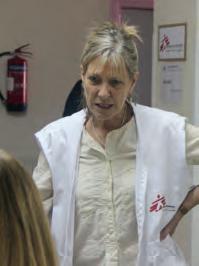
I worked at our hospital in Tacloban, which provided assistance to the survivors of Typhoon Haiyan. My role was to manage the maternity unit, which included the antenatal department, labour and delivery unit, the postnatal ward and the neonatal nursery. Many women had had minimal or no antenatal care, and would only access a hospital if there was a problem. I often looked after women who had had many pregnancies; many had lost several babies, either during pregnancy, at birth, or in the first few years of life.
I remember one woman who came in bleeding from a miscarriage. It had been her fourth pregnancy and she told me her three other children had drowned when the typhoon hit. She was gentle and friendly and could not thank us enough for our help.
I had to adapt to unfamiliar situations, deal with things you would never have to manage at home, and work with people who had minimal knowledge about health care. But I think working in such a setting made me a better midwife.
FIELD STAFF: 1,866
7,850 mosquito nets were distributed. A temporary respite care unit in Dan Issa relieves the pressure on the Madarounfa centres during the malnutrition peak and cares for the most severely ill children.
In June, a project in Abala providing access to healthcare to 10,000 Malian refugees was handed over to the Qatari Red Crescent. More than 61,700 consultations – mainly for malaria and respiratory infections –were provided, including 6,260 antenatal consultations, 1,000 postnatal consultations and 1,160 deliveries. More than 10,600 children were screened for malnutrition, with 750 admitted to therapeutic feeding centres.
KEY ACTIVITIES: Emergency healthcare, maternal healthcare, cholera, sexual violence
FUNDING: $1,200,000
Political instability, numerous attacks by Boko Haram and security operations by the Nigerian army forced thousands of people to flee their homes this year, with most displaced people settling in host communities or camps where medical supplies and physicians are extremely limited. Meanwhile, maternal mortality rates around the country remain high, and populations in several states are vulnerable to seasonal outbreaks of infectious diseases. Médecins Sans Frontières continued to work to provide healthcare to those in need, but the security situation posed ongoing challenges to our operations.
In the aftermath of attacks by Boko Haram, up to 400,000 people settled in and around Maiduguri, the capital of Borno state.
Médecins Sans Frontières began working in two camps in the area, providing access to
primary healthcare, malnutrition screenings, and maternal care to internally displace people. Between September and December 2014, Médecins Sans Frontières provided more than 2,400 consultations across the two camps, mainly for cases of malaria and diarrhoea. A cholera outbreak at the end of September resulted in 4,500 cases and 70 deaths in Maiduguri. Médecins Sans Frontières set up a cholera treatment centre with 120 beds and five posts for oral rehydration. By December, Médecins Sans Frontières had supported the care of 6,800 patients, 40 per cent of whom were displaced people living in camps.
At Jahun hospital, Jigawa state, where maternal mortality rates have been among the highest in the country, Médecins Sans Frontières continued to support the emergency obstetrics program, which
FIELD STAFF: 508
admitted a total of 7,980 women, an 11 per cent increase over 2013. More than 5,700 births were assisted. Jahun hospital also treats fistula, with Médecins Sans Frontières’ support. Obstetric fistulas are injuries to the birth canal, usually caused by complicated or prolonged labour and resulting in pain, incontinence and often social stigma.
Médecins Sans Frontières offers reparative surgery, as well as psychosocial support, helping women to reintegrate into their communities. A total of 264 women benefited from fistula surgery in 2014.
Médecins Sans Frontières also maintains an emergency response unit in Nigeria to provide early warning and rapid response to seasonal outbreaks of infectious diseases. In 2014, the unit responded primarily to outbreaks of cholera, treating more than 6,000 people for cholera across several states. Some 330 people were also treated for meningitis in Aliero. Banditry and attacks on villages limited the movement of the emergency team for short periods from time to time.
Regions where MSF has projects Cities, towns or villages where MSF works Nigeria JAHUN BORNO Project locations funded by Australian donorsMédecins Sans Frontières offers reparative surgery for obstetric fistula, as well as psychosocial support, helping women to reintegrate into their communities. A total of 264 women benefited from fistula surgery in 2014.Projects funded by Australian donors
KEY ACTIVITIES: Emergency response,maternal healthcare, paediatrics, surgery
FUNDING: $2,373,817
Project locations funded by Australian donors
One in 12 children born in Pakistan dies before the age of five and Pakistan has the sixth-highest maternal mortality rate in the world. As such, mother and child health remains a focus for Médecins Sans Frontières, particularly for those in vulnerable communities largely excluded from medical care, including people displaced by conflict, and marginalised, lowincome groups.
Peshawar
Médecins Sans Frontières runs a specialist maternity hospital in Peshawar, which receives patients referred from a number of health districts and hospitals. The hospital includes a 28-bed neonatal unit. Over 3,700 patients were admitted and 3,268 babies were delivered at the hospital in 2014. 670 surgical procedures were performed, and 715 newborns were admitted to the neonatal unit.
Mother and child health is also the focus at the Médecins Sans Frontières-supported government hospital in Hangu, a district directly affected by sectarian conflict and Taliban insurgency. Médecins Sans Frontières runs a 24-hour emergency room, an operating theatre and surgical wards and provides technical and referral support to the delivery room. Médecins Sans Frontières also supports the health ministry’s blood bank and X-ray departments, and assists with emergency responses in the event of mass casualties and epidemics. In 2014, more than 27,400 patients were seen in the emergency room, and 1,300 patients admitted for surgery. More than 3,400 deliveries were conducted, with 1,080 newborns admitted to the neonatal unit.
NAME: Emma Clark
FROM: Hobart, Tasmania
FIELD ROLE: Medical Doctor in Hangu, Pakistan, July to October 2014
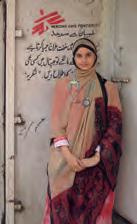
FIELD STAFF: 1,558
Kurram
In the Sunni enclave of Sadda, Kurram Agency, Médecins Sans Frontières runs a paediatric outpatient department for children up to the age of five, inside Tehsil Headquarters Hospital. There is also a therapeutic feeding program for this age group. Newborns and children under 12 needing hospitalisation are treated on the Médecins Sans Frontières-supported paediatric ward, and referrals are organised. Médecins Sans Frontières staff also assisted the ante- and postnatal departments. In addition, some 160 patients received treatment for cutaneous leishmaniasis. In Alizai, a Shia community in Kurram, Médecins Sans Frontières operates a paediatric outpatient department for children under 12 years of age. More than half (59 per cent) of patients in 2014 were under the age of five. In 2014 across Kurram, more than 34,800 medical consultations and 5,540 maternal and child consultations were provided and 3,180 patients were hospitalised (95 per cent of whom were under five years).
I was working in Hangu, a rural town in Pakistan where there is a long history of conflict between different cultural and religious groups.
I managed the newborn unit and emergency department. In the newborn unit, we had to resuscitate and treat newborn babies on a daily basis. This was partially because of some dangerous birthing practices which are unfortunately common in the area. In the emergency department, we treated many patients with major and/or multiple injuries due to traffic accidents and violence. I noticed that the people who needed our help most were the innocent bystanders who were unlucky enough to get caught in crossfire. Sometimes we needed to respond to bomb blasts or large car accidents, in which we treated many injured patients at once. The pace in the emergency room was often frantic and could tend towards chaotic, but the team of Pakistani doctors and nurses worked with dedication and efficiency. I am sure they were urged on, as I was, by the belief that we were really making a difference to people in their hardest times.
Sans Frontières continued to work to meet the overwhelming need for mother and child healthcare in Pakistan this year.BALOCHISTAN FATA SINDH KHYBER PAKHTUNKHWA
Projects funded by Australian donors
KEY ACTIVITIES: mental healthcare, surgery FUNDING: $200,000
Project locations funded by Australian donors
Violence increased across the Palestine in 2014, and the year was marked by a 50-day war with Israel. Médecins Sans Frontières doubled its capacity to help meet medical and psychological needs.
With violence between Palestine and Israel intensifying throughout the year, thousands of Palestinians were killed, injured or displaced, while many others suffered from a lack of access to adequate healthcare. Living conditions continue to deteriorate throughout the territory.
Gaza
In Gaza, the growing number of casualties of violence led Médecins Sans Frontières to establish an emergency surgical team in Gaza between July and September. A permanent reconstructive surgery team was
present until December. Over 320 surgical procedures were carried out over the course of the year. Médecins Sans Frontières also maintained two post-operative clinics, which provided care including 12,700 wound dressings and 11,800 physiotherapy sessions and occupational therapy. A mental health program was reopened and integrated into the post-operative care program.
West Bank
In the West Bank, a mental health team worked to alleviate the psychological suffering of those people confronted with
FIELD STAFF: 121
continued violence, offering group and individual counselling sessions with clinical psychologists, doctors, and social workers. This team provided 2,200 mental health consultations to 238 new patients in 2014. A mental health program was started by Médecins Sans Frontières in Nablus and Qalqilya governorates in the West Bank in 2000, extending to east Jerusalem in 2011. The program focuses on adults and children who have experienced or witnessed violence, and whose psychological suffering impedes their normal life. It aims mostly to help those served evacuation orders, whose homes are demolished and those under regular attack from settlers and Israel Defense Forces search and arrest operations. More than 2,200 individual psychological consultations were provided during the year.
Regions where MSF has projects Cities, towns or villages where MSF works GAZA STRIP NABLUSMédecins Sans Frontières also maintained two post-operative clinics, which provided care including 12,700 wound dressings and 11,800 physiotherapy sessions and occupational therapy.
KEY ACTIVITIES: Tuberculosis FUNDING: $1,063,333
Project locations funded by Australian donors

This year Médecins Sans Frontières opened a project for the diagnosis and treatment of tuberculosis (TB) in Gulf province.
Tuberculosis is a significant public health problem in Papua New Guinea. In May 2014, Médecins Sans Frontières started supporting Kerema general hospital, Gulf province, to improve detection rates for TB. The hospital, including the laboratory, was renovated and a consultation room was established for suspected TB cases. Over 290 people were diagnosed and treated, and patient education and counselling activities were organised. Teams also began to offer
diagnosis and treatment to people living in remote areas, some only accessible by boat. Médecins Sans Frontières and the US technology company Matternet successfully trialled the use of unmanned aerial vehicles for the transportation of sputum samples and results between distant health centres and Kerema hospital.
FIELD STAFF: 219
NAME: Philippa Collins
FROM: Mornington, Victoria
FIELD ROLE:
Nurse in Minkamman, South Sudan
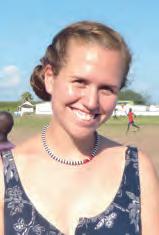
I was based in an Internally Displaced Persons camp in Minkamman, South Sudan. My role was to manage Médecins Sans Frontières’ outpatient department, and a small measles vaccination team.
The work was so different from my work in Australia. The most obvious difference, and at times the most challenging, was in the resources available for healthcare. It really made me appreciate the resources and services we have readily available in Australia. It also challenged me to think creatively and question why we do what we do. In South Sudan, there are no machines to watch; you just have the patient in front of you. It encourages you to reflect, and forces you to trust your nursing practice.
What always amazed me most was the resilience and strength shown by families who had been displaced, and who had seen the health, education and other important infrastructure within their country disrupted due to conflict. Despite this, they still appreciated what they did have. They had a willingness to help others, and a capacity to find joy.
Cities, towns or villages where MSF works Papua New GuineaProjects funded by Australian donors
KEY ACTIVITIES: Maternal healthcare, paediatrics, primary healthcare, vaccinations
FUNDING: $3,795,000
Project locations funded by Australian donors
Throughout 2014, Médecins Sans Frontiéres responded to emergency medical needs arising from conflict while striving to maintain its preexisting, essential healthcare programs in South Sudan.
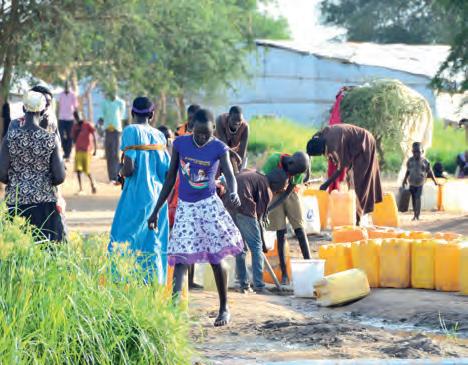
When fighting broke out in the capital, Juba, at the end of 2013 and rapidly spread through the country, Médecins Sans Frontières started dispatching medical supplies and staff to critically affected locations. The number of projects increased from 13 to more than 20 across nine states. Many people fled their homes and thousands hid in the bush. An estimated 1.5 million people were internally displaced at the end of 2014.
Médecins Sans Frontières provided basic and specialist healthcare, including vaccinations, in Minkamman camp, Awerial. Around 95,000 displaced people live in the camp, and more have settled in the surrounding areas. Teams carried out more than 52,000 outpatient consultations and 2,700 mental health consultations and also launched vaccination campaigns against measles, polio, cholera and meningitis. Following a measles outbreak in Cueibet county in late March, Médecins Sans Frontières provided support to the health ministry and organised a vaccination campaign against measles and polio that reached 32,700 children under five.
Since 2008, Médecins Sans Frontières has supported Aweil civil hospital, with around-the-clock paediatric and maternity services, including high-risk and emergency obstetric care. More than 7,100 women were admitted to the maternity ward and over 1,500 complicated deliveries were assisted during the year. In addition, Médecins Sans Frontières treated more than 30,000 people for malaria in 2014 – three times as many as the previous year.
Located in the northern state of Unity, the Yida refugee camp remains the main camp for people fleeing conflict in South Kordofan, Sudan. Médecins Sans Frontières began to intervene in October 2011, and although the situation has gradually improved, the residents depend entirely on humanitarian organisations to provide water, shelter and medical care. Médecins Sans Frontières continues to provide primary and secondary healthcare for the camp, which has a population of about 70,000 people. In 2014, Médecins Sans Frontières conducted more than 100,000
FIELD STAFF: 3,996
consultations and more than 2,500 patients were hospitalised. Teams conducted a mass measles vaccination campaign for more than 42,000 children aged nine months to 15 years. Around 10,000 children under two also received pneumococcal vaccines in the first pneumococcal vaccination campaign ever conducted in a refugee camp setting.
The northern Jonglei region experienced a resurgence of clashes in late 2014. The health centre in Old Fangak, supported by a local NGO, was overwhelmed by the influx of wounded and displaced. In response to these new health care needs, Médecins Sans Frontières turned the health centre into a 45-bed hospital with capacity for mass emergencies.
KEY ACTIVITIES: HIV/AIDS
FUNDING: $1,000,000
Project locations funded by Australian donors
The co-infection rates of HIV and tuberculosis (TB), including drug-resistant TB (DR-TB), are extremely concerning, and 10 per cent of people with TB are diagnosed with a drug-resistant form of the disease.
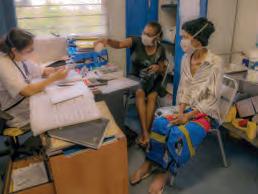
Shiselweni
Médecins Sans Frontières began collaborating with the health ministry to address the HIV/TB epidemic in Shiselweni in 2007. In 2014, Médecins Sans Frontières supported integrated HIV and TB care with projects in Nhlangano, Hlatikulu and Matsanjeni. Patients are now able to access
treatment and psychosocial support through 22 health clinics and three specialised facilities. A five-year evaluation on the decentralisation of care demonstrated that simplifying care and bringing it closer to home is sustainable, leads to increased access to antiretrovirals and helps patients adhere to their drug regimens.
Central to the program are the HIV-positive community members trained by Médecins Sans Frontières and the health ministry, who carried out more than 3,200 health education sessions, reaching some 137,100 people in Shiselweni in 2014. Door-to-
NAME: Karen Chung
FROM: Auckland, New Zealand
FIELD ROLE: Medical Doctor in Manzini, Swaziland, February 2014 to February 2015
My work in Swaziland involved all sorts of medical care – for TB, HIV, sexual and gender-based violence, antenatal and postnatal care, and many different chronic and infectious diseases.
While there, I regularly had to confront deficiencies in the basics of health care, things that we usually take for granted. For example, there was an outbreak of rotavirus –a disease which is vaccine-preventable and highly treatable – from which more than 30 babies died.
But working with patients was always rewarding. Many babies who arrived flat during the rotavirus outbreak left incredibly bright-eyed and perky. Our young sexual violence survivors often dealt with their trauma in heartbreakingly brave and open ways. TB patients who had suffered goodhumouredly through years of treatment will soon have access to new drugs that may offer hope of a cure. The sexual
FIELD STAFF: 406
door HIV testing has been integrated into the program, increasing the detection of HIV-positive people. Additionally, routine viral load measuring has been implemented to monitor health status, which allows for the identification of patients whose viral load is “undetectable”, meaning that the virus is under control and that the risk of transmission is markedly lower.
A national ‘treatment as prevention’ strategy targeting pregnant women was implemented in 2014 after proving effective in a pilot project in Nhlangano. The second phase of the ‘Early Access to Antiretrovirals for All’ campaign was launched in Nhlangano in October, providing all HIV-positive patients with antiretroviral treatment whatever their clinical or immunological status.
violence program continues to build. I was lucky enough to have been part of those conversations of cautious hope, and to have been part of a team trying to do good work.
SHISELWENI Regions where MSF has projects Cities, towns or villages where MSF worksIDLIB
ALEPPO KEY ACTIVITIES: Burns care, emergency medicine, mental healthcare, surgery, maternal healthcare, supply, vaccinations
FUNDING: $965,000
Project locations funded by Australian donors
Despite the huge needs in Syria, Médecins Sans Frontières’ activities were severely limited by the violence and insecurity, risk of kidnappings and assaults on medical workers, and the major constraints imposed by those involved in the conflict.
The war entered its fourth year in 2014, and continued to be defined by brutal violence that does not distinguish between civilians and combatants. An estimated 200,000 people have been killed, and half the population is displaced either within Syria or in neighbouring countries. Entire communities are besieged and cut off from any outside assistance and people are trapped between the ever-shifting frontlines. Thousands of doctors, nurses, pharmacists and paramedics have been killed, kidnapped, or displaced by violence.
On 2 January 2014, ISIS (later renamed Islamic State; IS) abducted 13 Médecins Sans Frontières staff members. Among them were eight Syrians who were released after a few hours. The remaining five international staff members were held captive for up to five months. The abduction led to the withdrawal of Médecins Sans Frontières’ international teams and the closure of health facilities in IS-held areas.
There are extreme shortages of goods due to the war, and the poor-quality fuel that families have to use for stoves and heaters frequently causes explosions, resulting in severe burns. In Idlib governorate Médecins
Sans Frontières runs the only burns unit in northern Syria where people can get specialist care, such as wound cleaning (debridement), dressing changes performed in the operating theatre under anaesthesia, skin grafts and physiotherapy. The 15-bed hospital has an emergency room, and a team offers psychological support to patients. More than 1,800 burns patients came to the facility in 2014 and over 5,800 patients were treated in the emergency room. The team performed more than 3,800 surgical interventions.
Médecins Sans Frontières conducted a vaccination campaign in response to reports of several measles cases in a community of some 100,000 internally displaced people along the border with Turkey. More than 11,000 children were vaccinated against measles in camps and villages in August. Médecins Sans Frontières is continuing routine vaccinations for children under three years old. The absence of routine vaccinations as a result of the war has led to a rise in preventable childhood illnesses.
FIELD STAFF: 729
Aleppo governorate has seen some of the most intense fighting, and is one of the main corridors for Syrians attempting to flee the country. Médecins Sans Frontières France ran a hospital in the Aleppo region that provided healthcare for adults and children, including surgery for war wounded, trauma cases and burns patients, as well as emergency services, maternity, antenatal and postnatal care and outpatient consultations. The hospital was closed in August due to security reasons.
Médecins Sans Frontières provides medical equipment and medicines to networks of Syrian doctors working in areas the organisation is unable to access. These support programs allow dedicated Syrian medical staff to work, often in extremely hazardous conditions, and bring a minimum level of healthcare to people trapped by the conflict.
More than 1,800 burns patients came to the facility in 2014 and over 5,800 patients were treated in the emergency room.
ADJUMANI KEY ACTIVITIES: HIV/AIDS, malnutrition, maternal care, vaccinations, water and sanitation FUNDING: $300,000
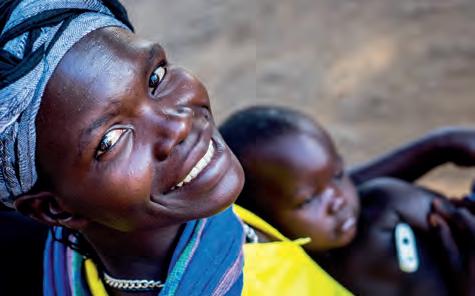
The majority of the refugees, some 81,000 of them, settled in northern Uganda’s Adjumani district. After being registered through Numanzi transit centre, they were dispersed to camps. Médecins Sans Frontières launched an emergency program to provide basic healthcare for refugees at the transit centre and in the four camps. Teams screened children for malnutrition, and set up outpatient and inpatient departments, maternity wards and an intensive therapeutic feeding centre. Water and sanitation activities were undertaken to ensure minimum hygiene standards were met. As the number of arrivals dropped and other agencies began to cover some of the needs, Médecins Sans Frontières shifted focus to the two largest camps in the south, Ayilo 1 and Ayilo 2, and health screening and consultations at the transit centre. More than 124,000 consultations were carried out and over 4,000 patients were admitted to hospital.
A significant number of refugee children seen by Médecins Sans Frontières had
respiratory infections, which can spread quickly in crowded environments. From July to September, Médecins Sans Frontières conducted three rounds of vaccination against pneumococcal disease and Haemophilus influenzae type B, the two main causes of respiratory infections in children. More than 2,700 children under two, living in the refugee camps or in the surrounding villages, were fully immunised against pneumococcal. This was the first vaccination campaign using pneumococcal conjugate vaccine ever run in Uganda, and one of the first in a refugee setting.
The HIV/TB program Médecins Sans Frontières started in 2001, based at Arua regional referral hospital, was handed over to the Ministry of Health and SUSTAIN, a Ugandan–American NGO, in July. The project included clinical care, the management of a laboratory for HIV, TB and drug-resistant TB testing and the
FIELD STAFF: 568
provision of antiretrovirals. Médecins Sans Frontières also handed over its management centre for multidrug-resistant TB.
Médecins Sans Frontières is continuing to work on improving access to viral load testing, including for infants, with the UNITAID-funded Treatment Success Project. A Médecins Sans Frontières team is also assessing specific medical needs related to HIV in particularly vulnerable groups, such as children, adolescents and mobile populations.
In October, one case of Marburg haemorrhagic fever was confirmed in Kampala, triggering a joint response by the Ministry of Health, Médecins Sans Frontières and the US Centers for Disease Control and Prevention. Médecins Sans Frontières set up five transit centres and one Ebola treatment centre within Kampala hospitals and trained staff working at these sites and in other provinces. No further cases were reported.
ARUA Regions where MSF has projects Cities, towns or villages where MSF works Project locations funded by Australian donors Mother and child l in Adjumani, Uganda. © Isabel CorthierMore than 2,700 children under two, living in the refugee camps or in the surrounding villages, were fully immunised against pneumococcal.Médecins Sans Frontières Australia
KEY ACTIVITIES: Emergency, maternal care, primary healthcare, surgery
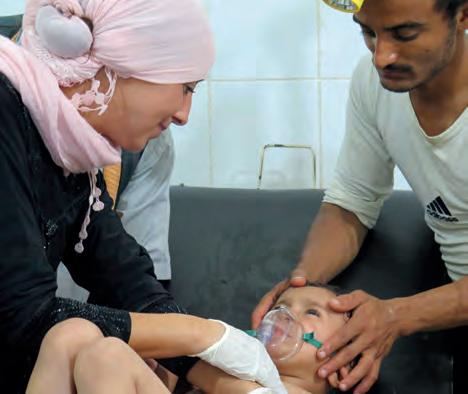
Amran
Médecins Sans Frontières teams in Amran governorate continued to support Al-Salam hospital, providing emergency, maternity, inpatient and outpatient services and assisting in the laboratory and blood bank. The hospital provided treatment of kala azar, rickets and chronic diseases, as well as supporting a growing number of burns victims and malnutrition patients. More than 2,300 surgical interventions and 25,300 emergency consultations were carried out, 5,200 patients were admitted to hospital and over 2,500 babies were delivered during the year.
In the north of Amran governorate, Médecins Sans Frontières supports the Huth health centre, providing assistance to the emergency unit, inpatient department and maternal healthcare. Médecins Sans Frontières also supports logistics at the clinic, and referral procedures to the Khamer hospital. To assist the communities in the remote Osman and Akhraf valleys, Médecins Sans Frontières supported the reopening of Heithah health unit in April, but insecurity caused the suspension and then the complete cessation of activity in November.
Aden
Médecins Sans Frontières’ emergency surgical unit in Aden re-established networks of medical referrals from Abyan, Ad Dhale, Lahj and Shabwah – places frequently affected by violence and increased surgical needs. More than 2,000 emergency consultations, 1,600 surgical procedures and 5,600 physiotherapy sessions were conducted in 2014. A weekly clinic in Aden central prison recorded more than
FUNDING: $2,710,000
Project locations funded by Australian donors
1,600 consultations. Support to Lawdar and Jaar hospitals in Abyan was stopped because Médecins Sans Frontières was seeing fewer victims of violence from these areas, and the networks were re-established and strengthened so patients could be referred to the Médecins Sans Frontières emergency hospital in Aden.
Projects funded by Australian donors
FIELD STAFF: 562
Médecins Sans Frontières set up a team to provide rapid medical aid following violence and other emergencies. Medical supplies were donated to clinics and hospitals, relief items were distributed to people forced to leave their homes by conflict and direct care was offered to victims of violence and the displaced. Medical items were donated to 38 health facilities in five governorates, including the capital Sana’a, and hundreds of displaced people received direct emergency support.
High levels of poverty and unemployment combined with continuous insecurity make it difficult for Yemenis to access healthcare.
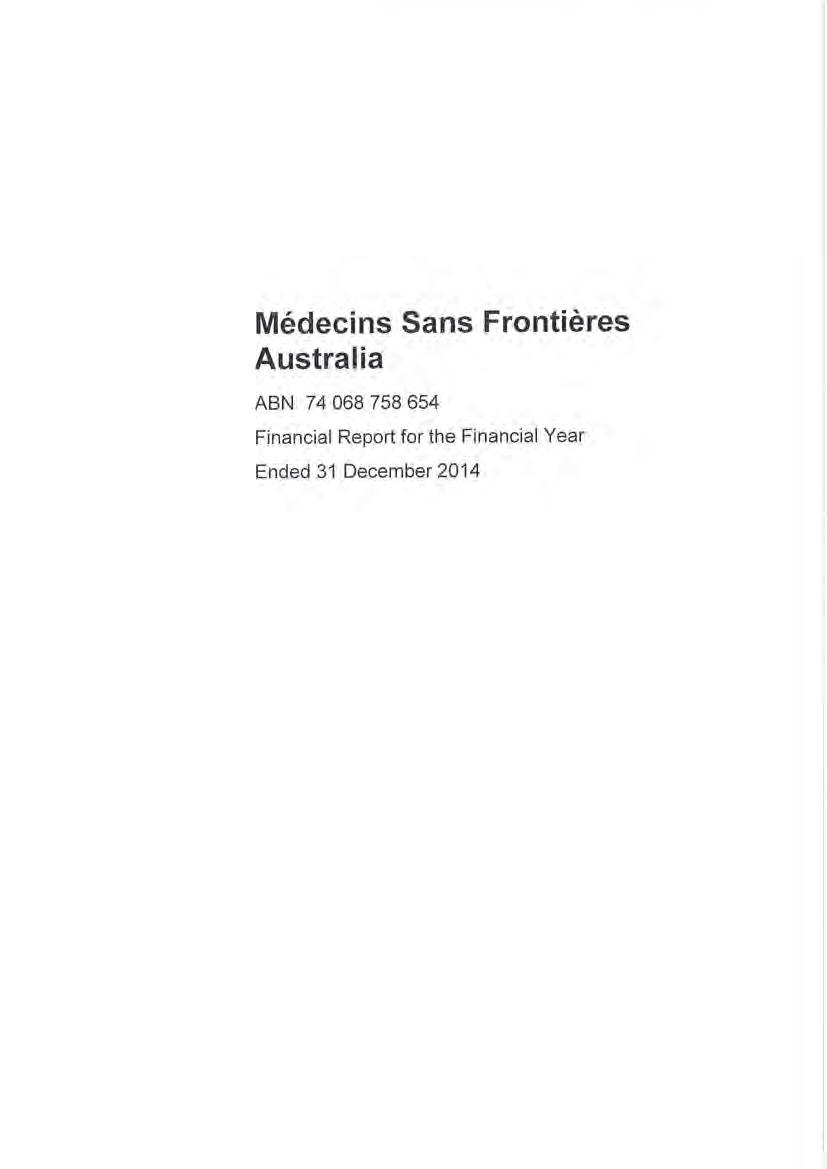

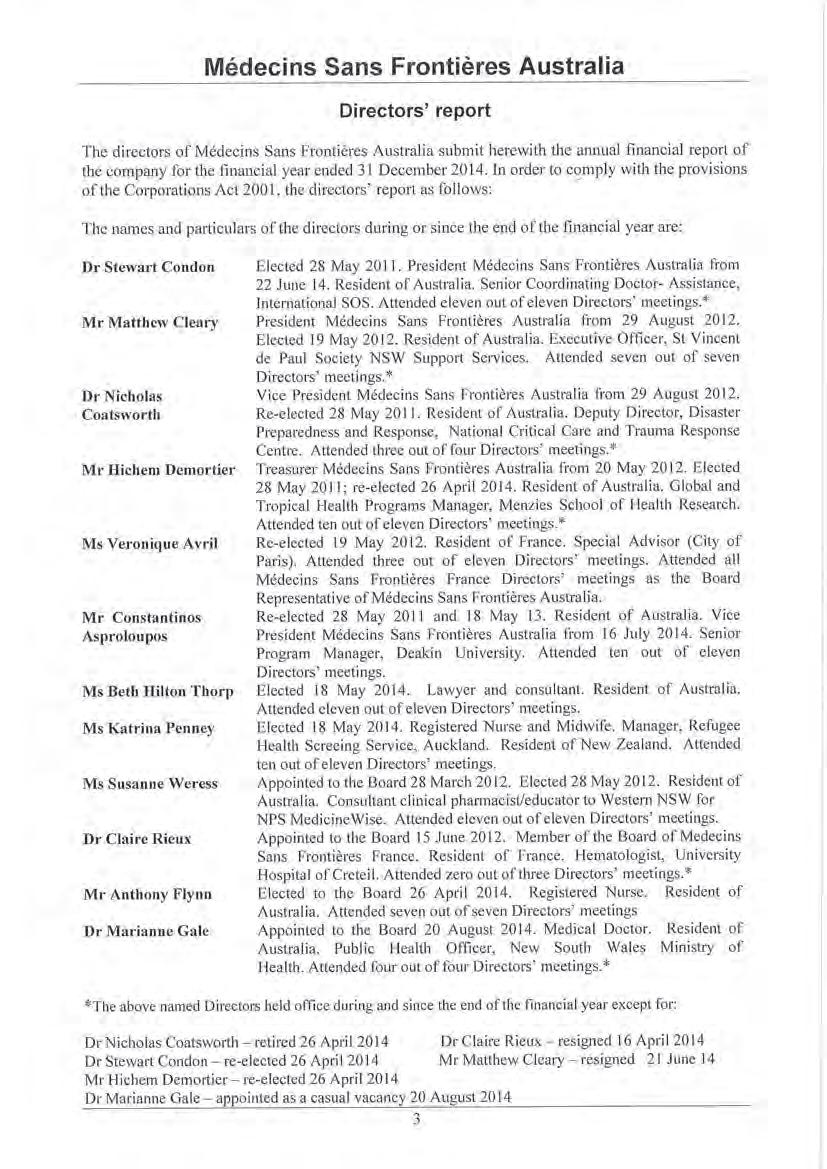

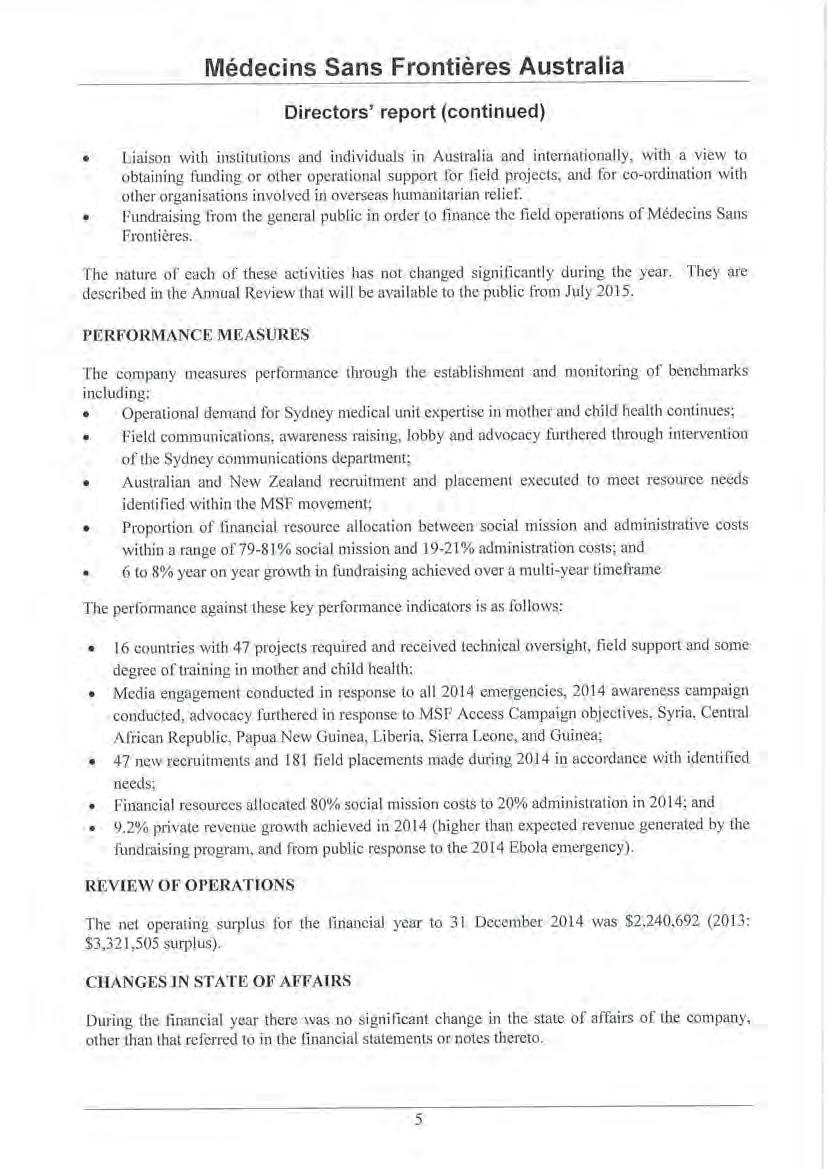
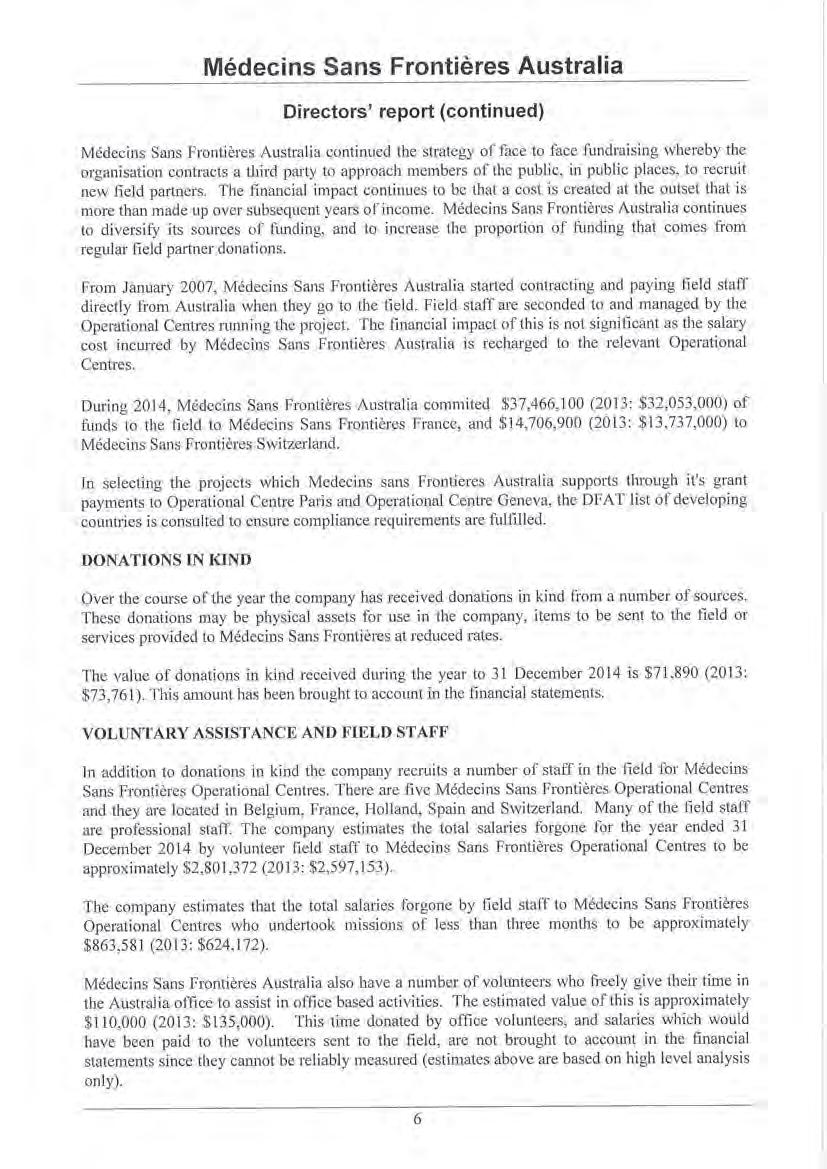


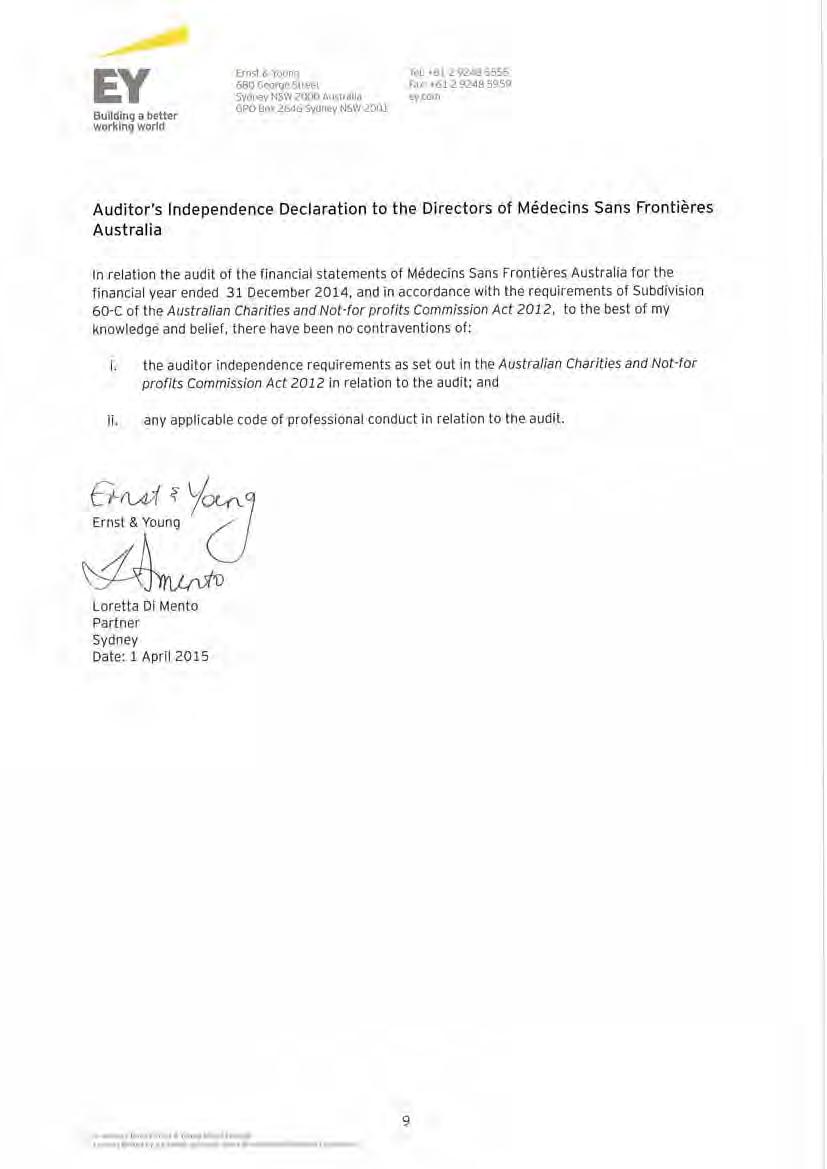

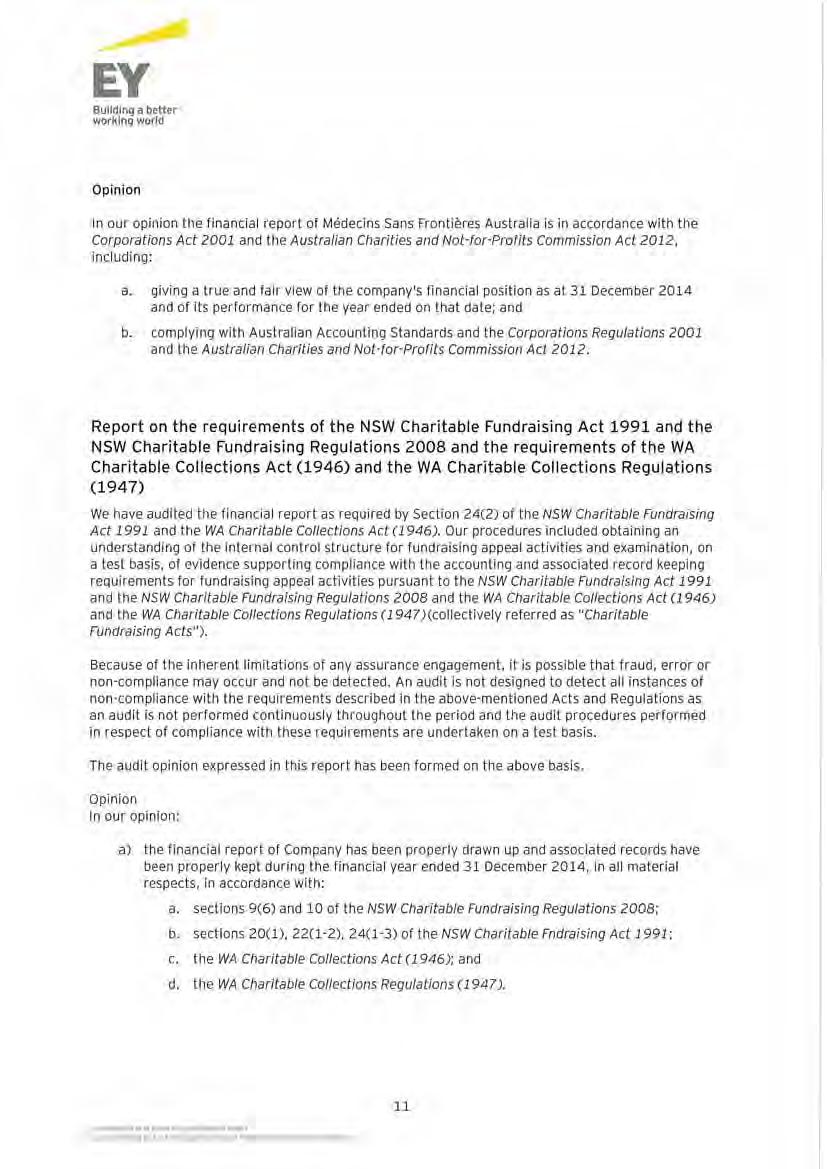

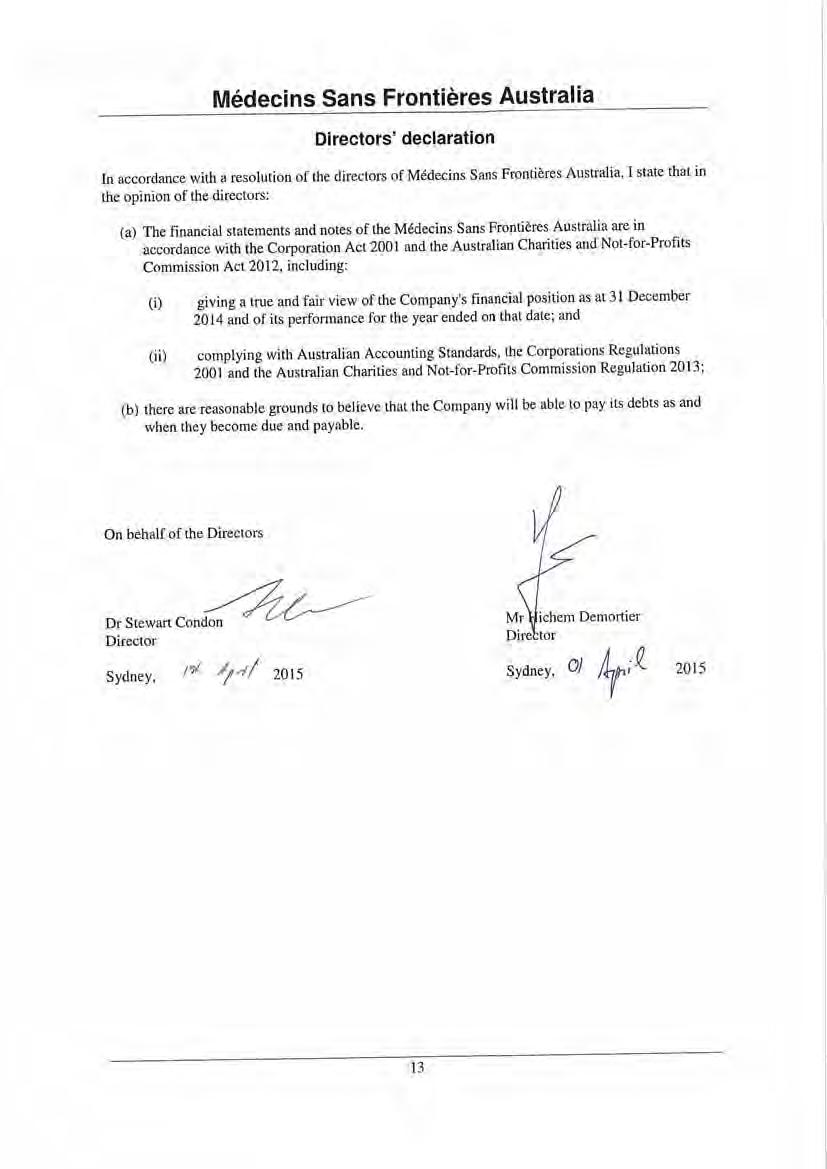
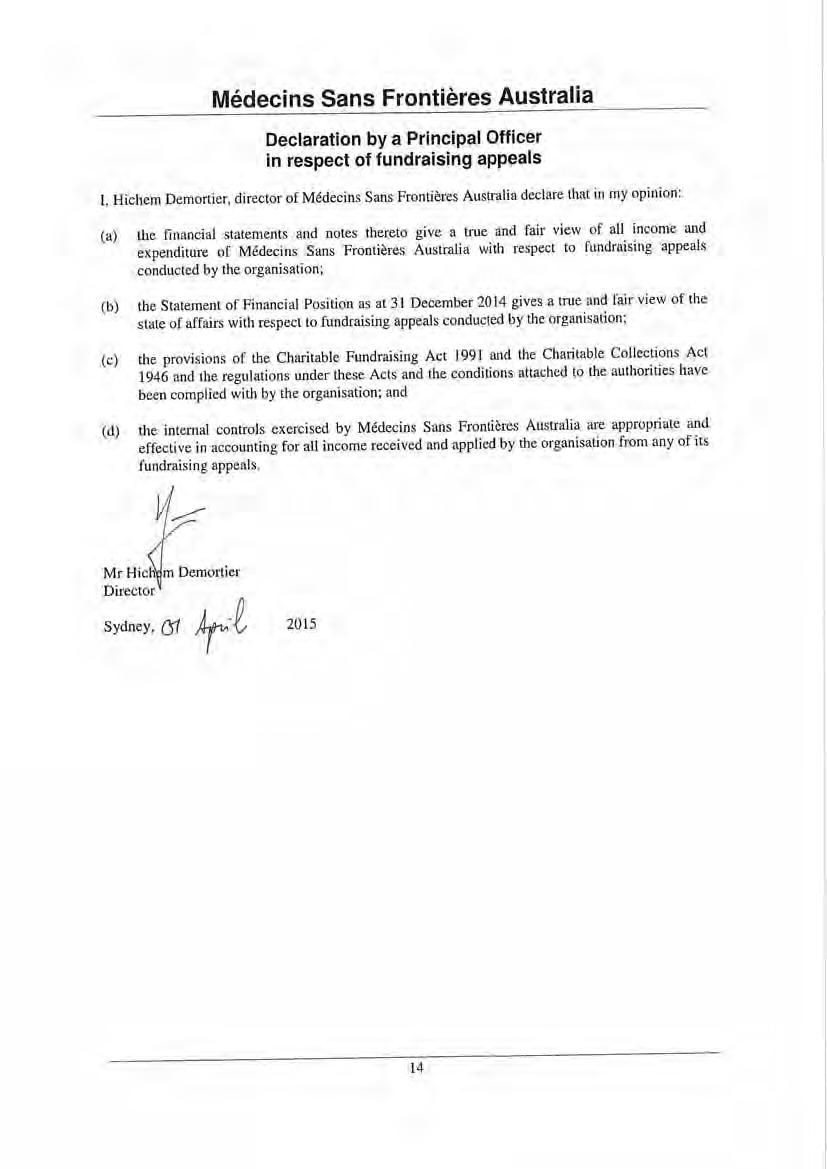
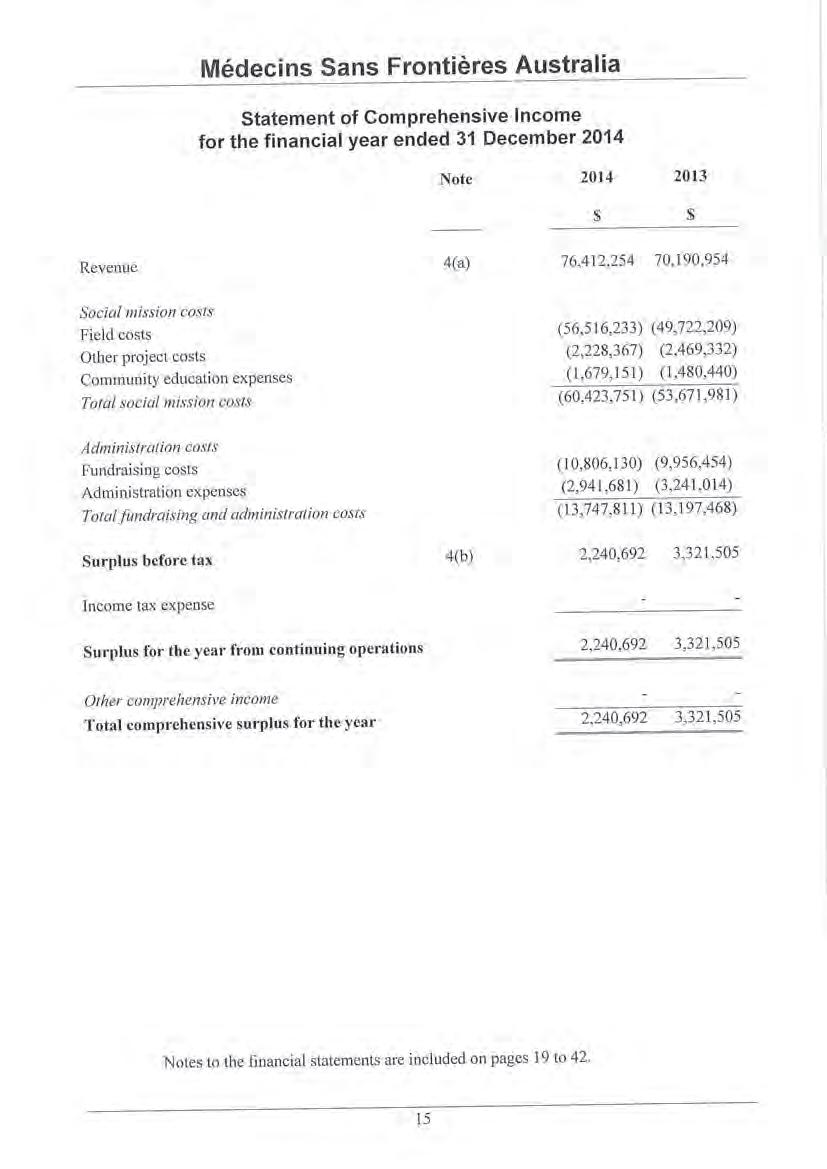
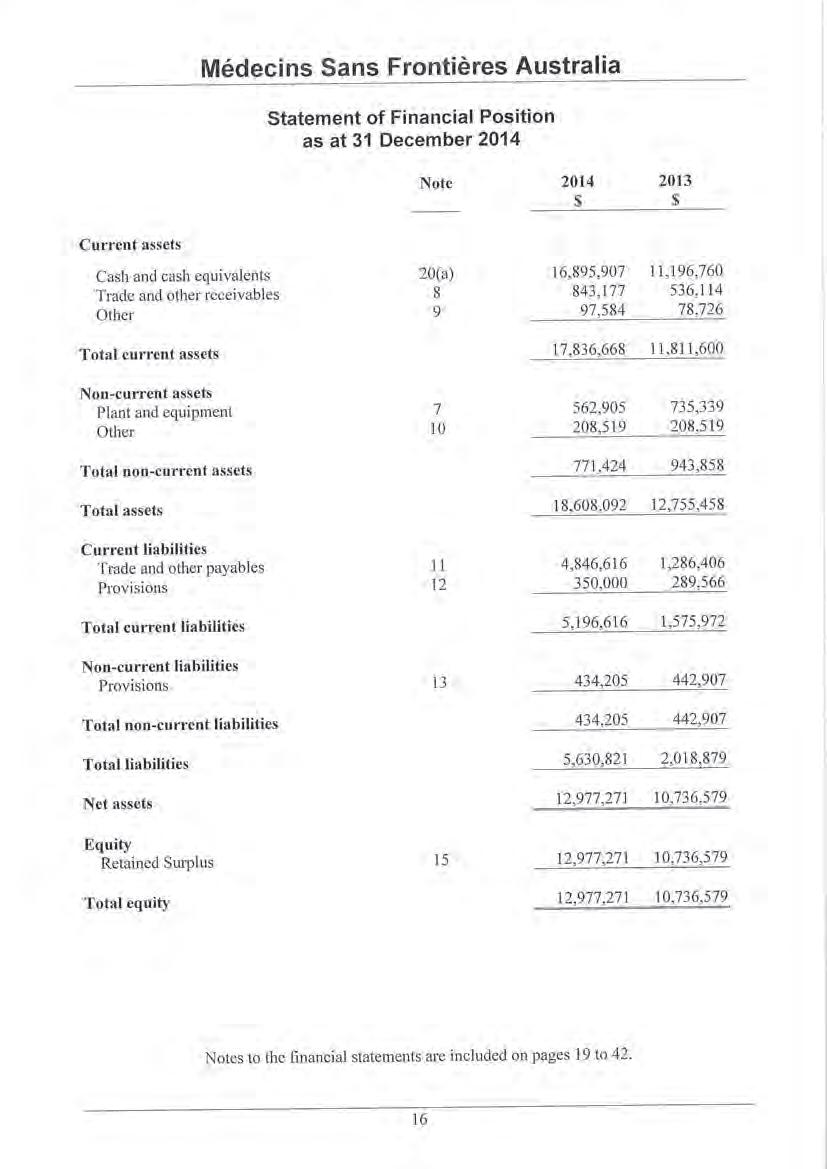

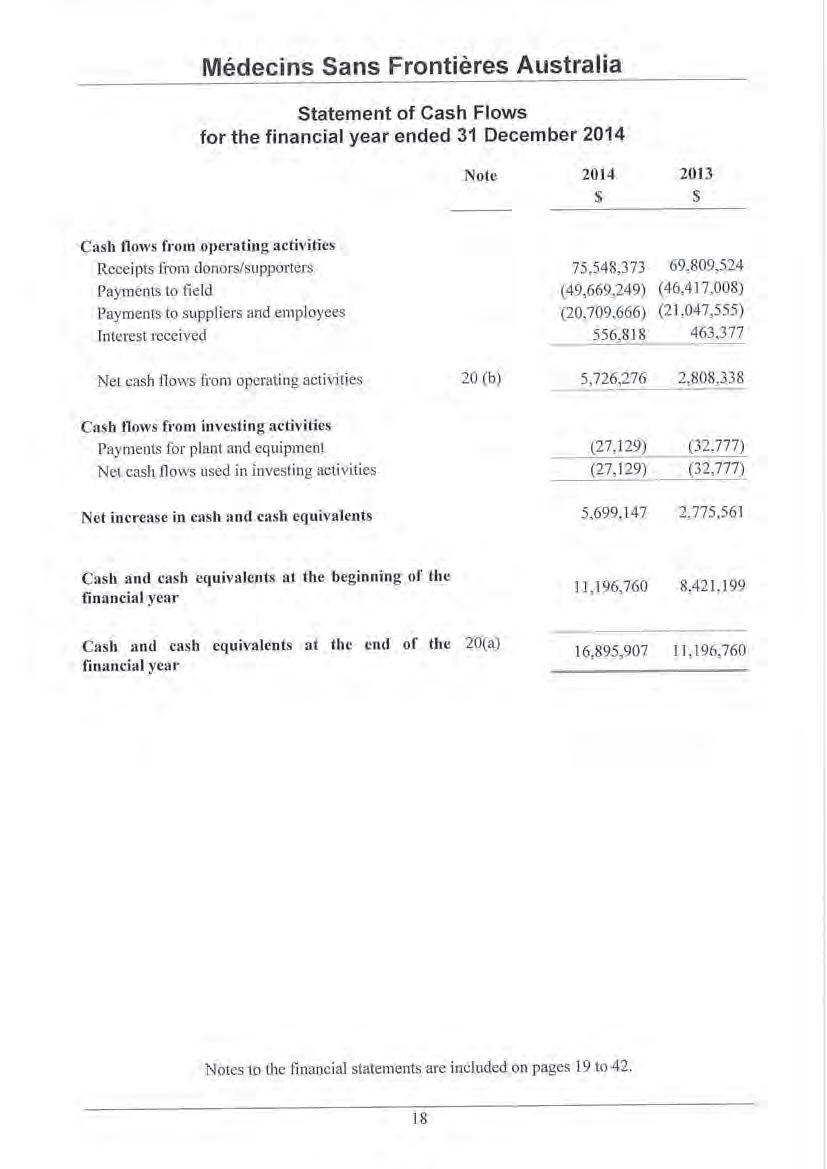


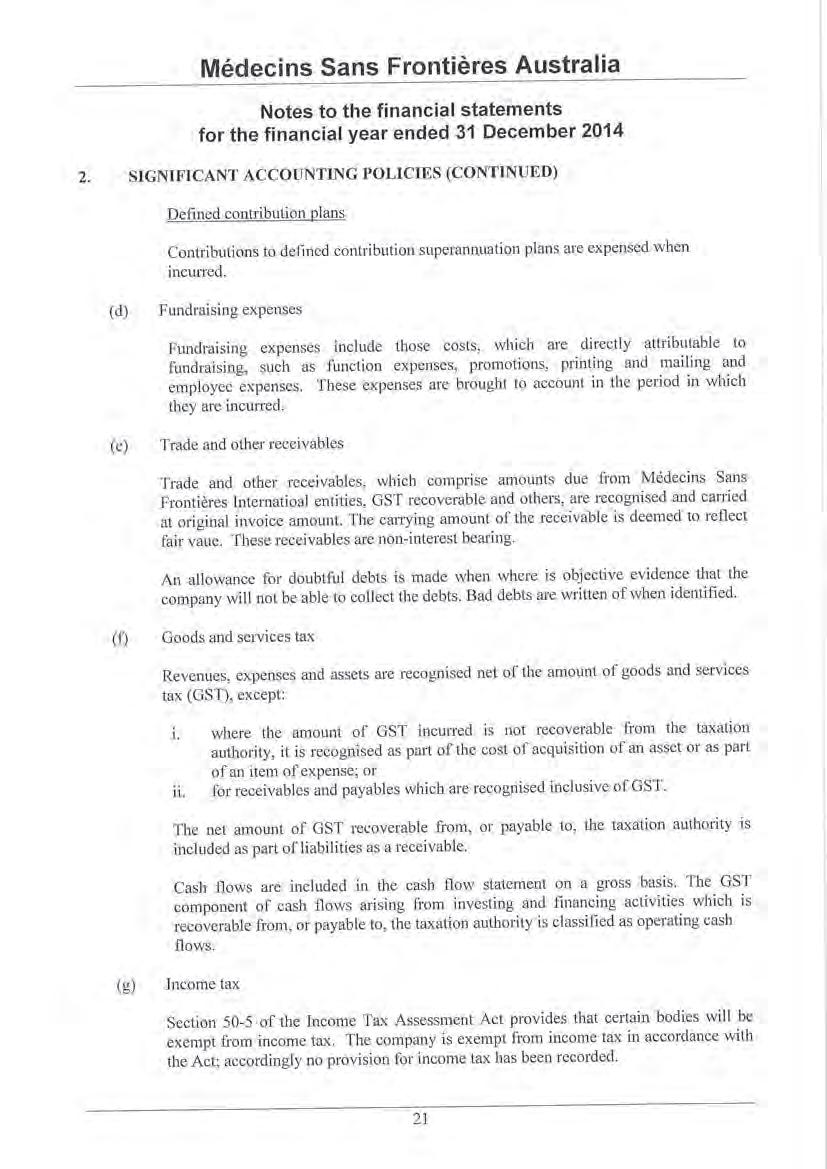
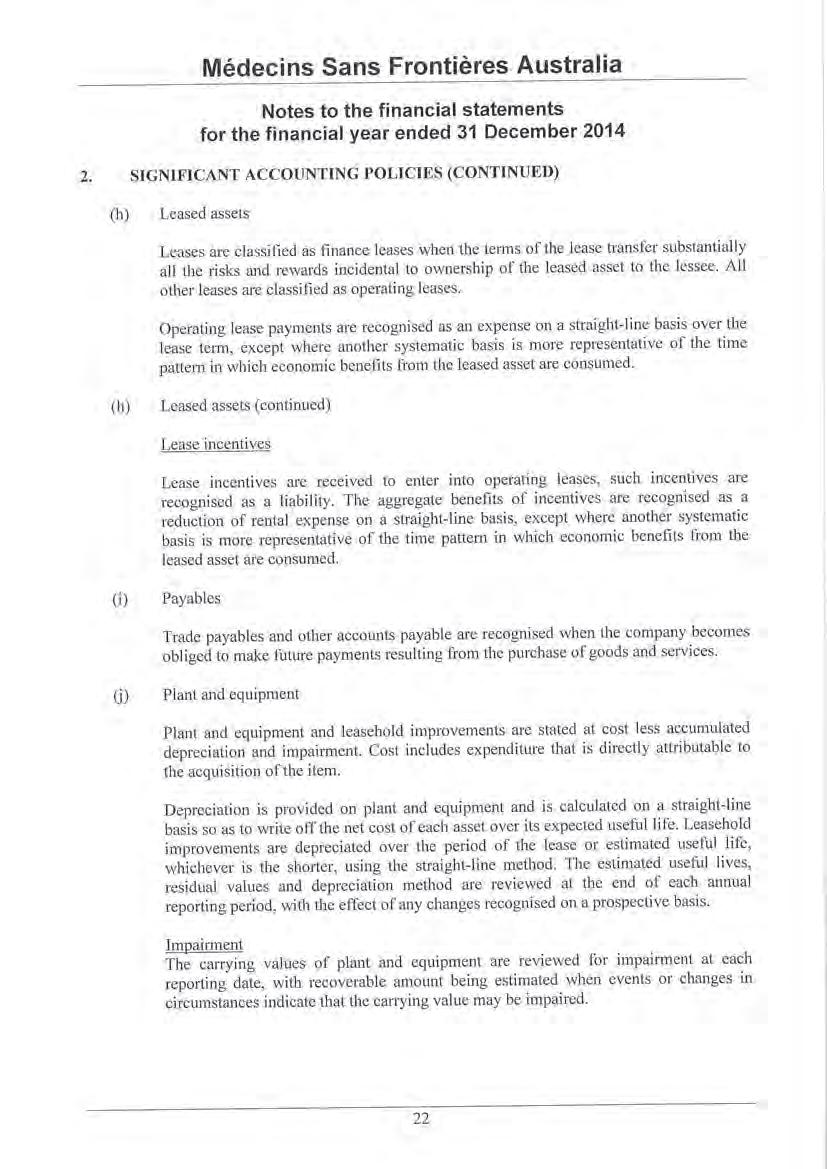

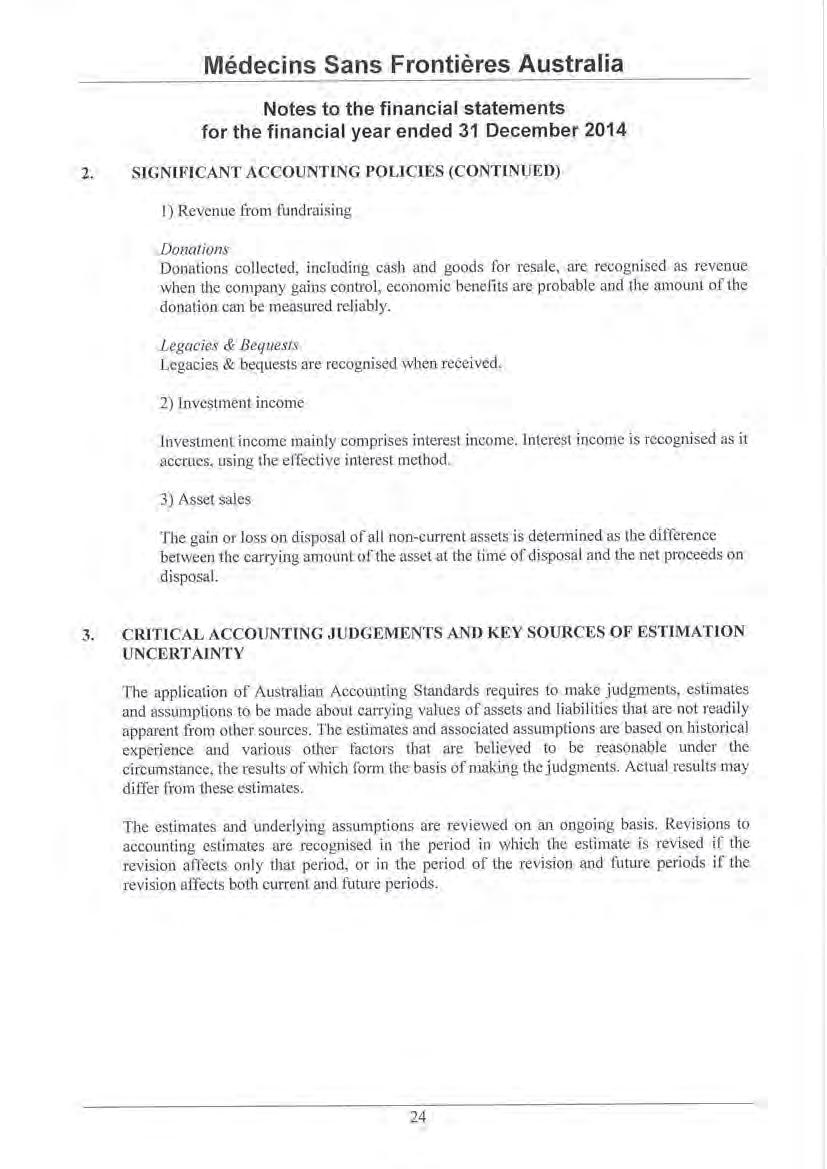
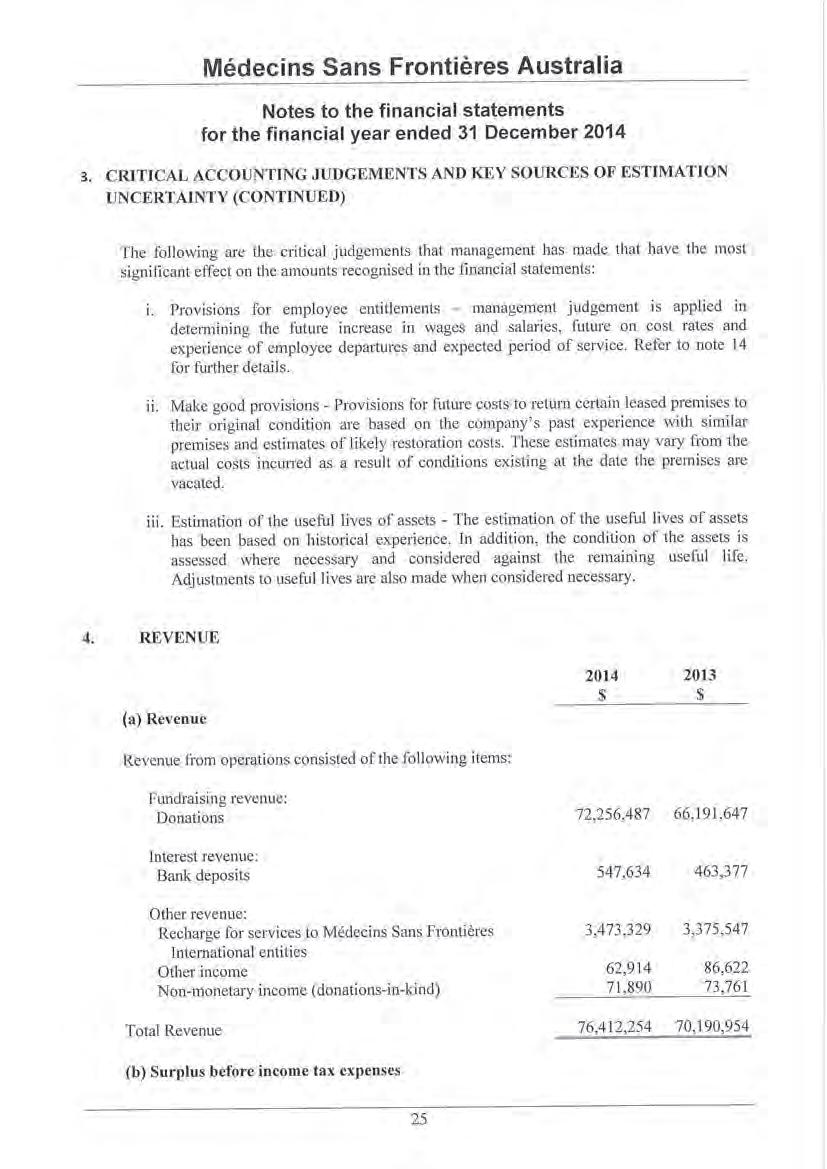
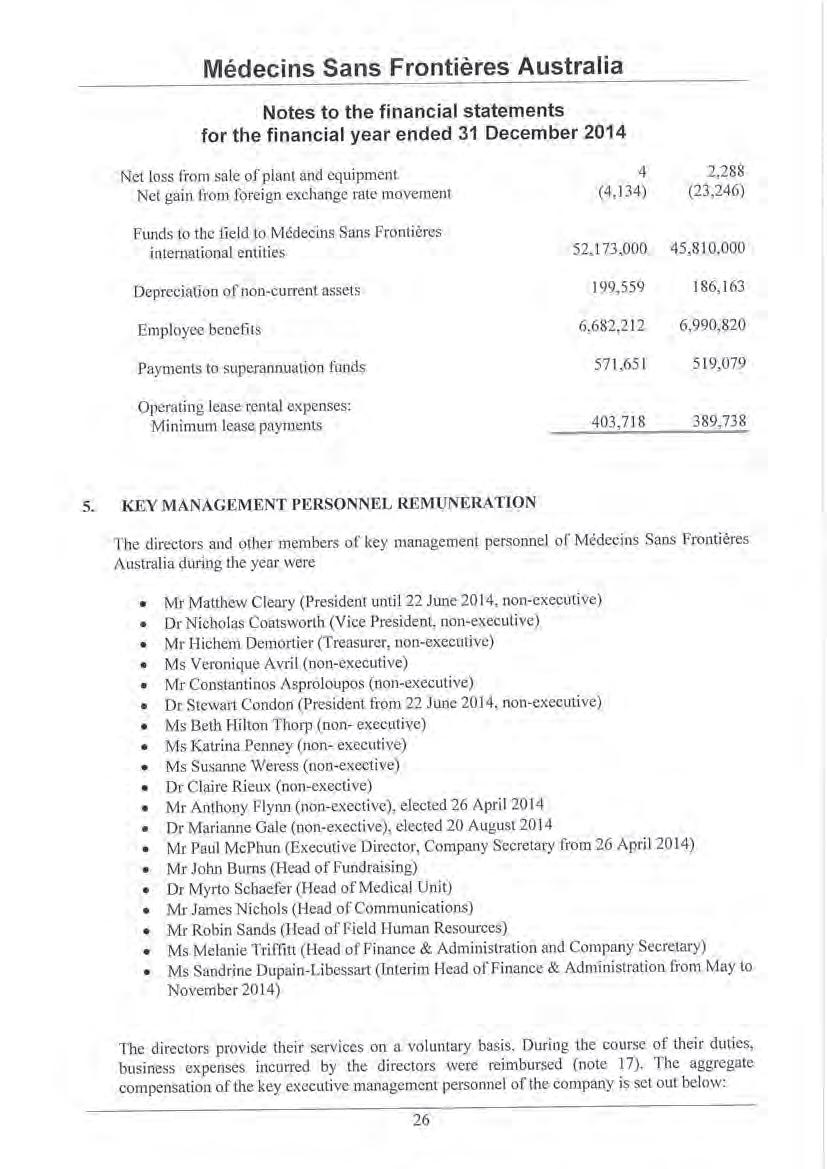
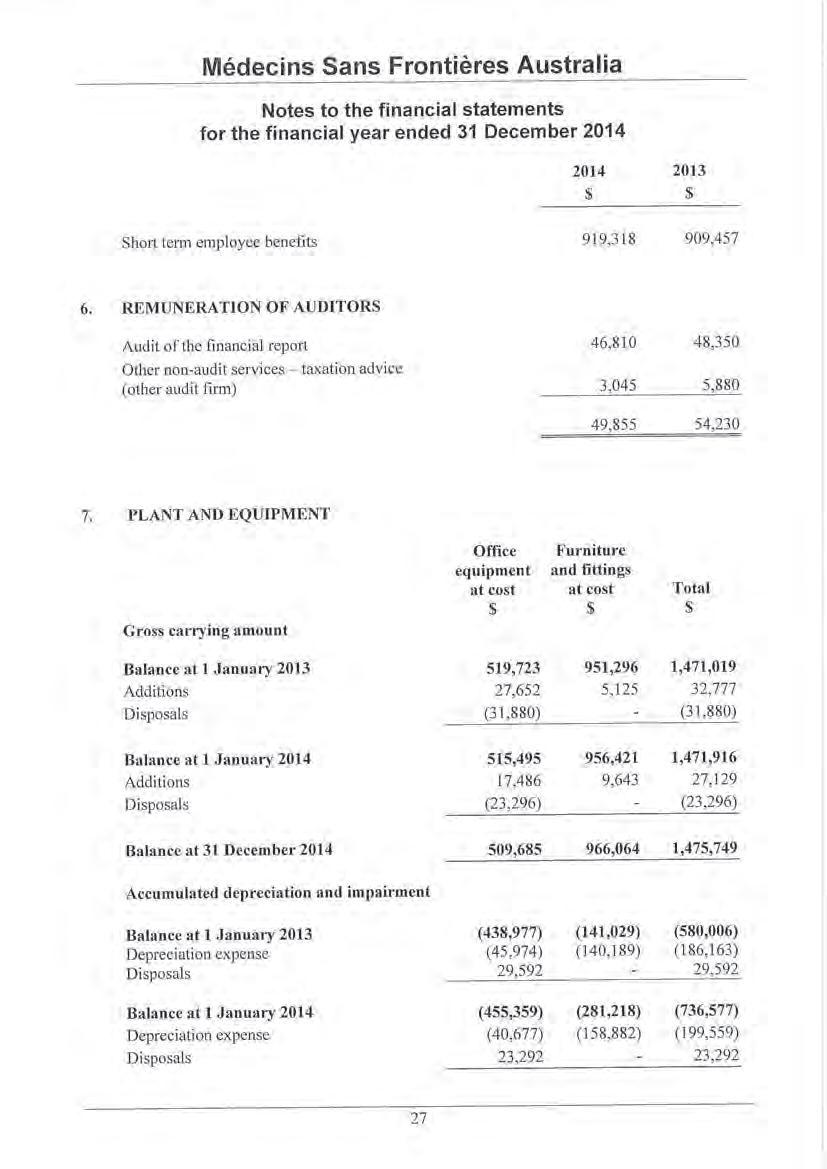
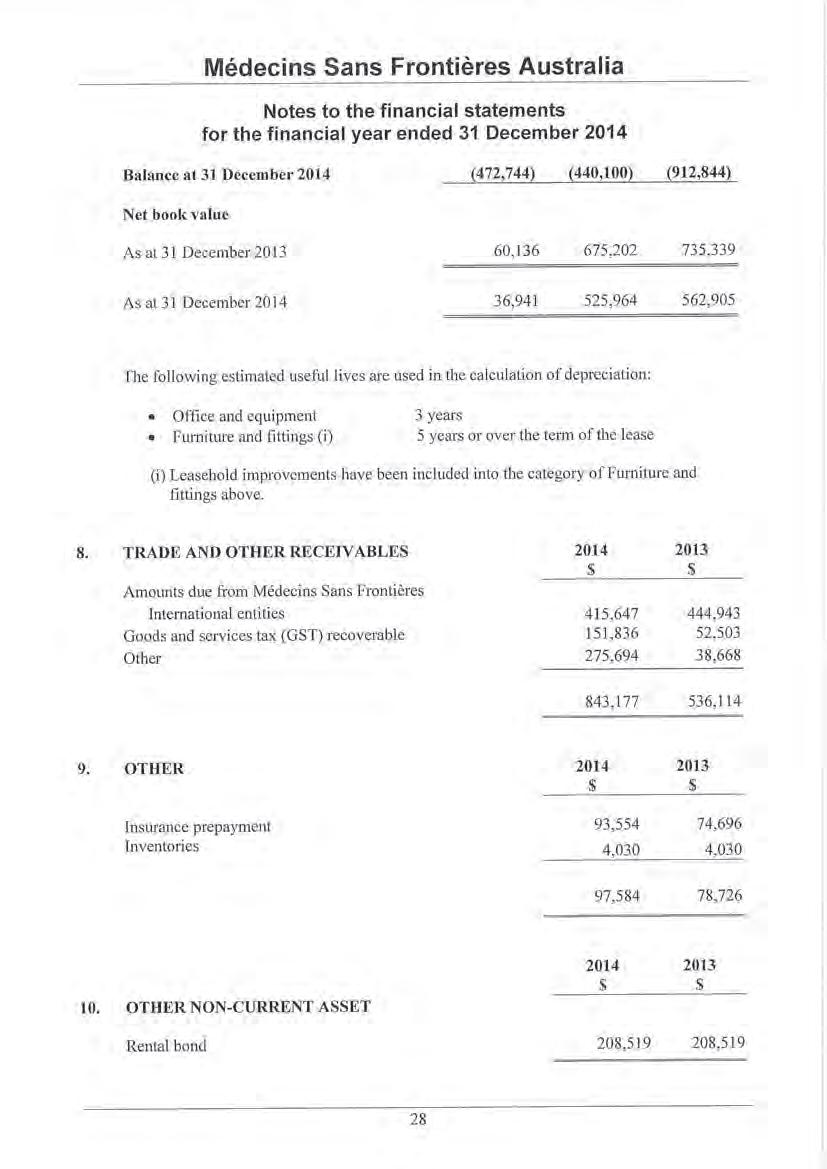

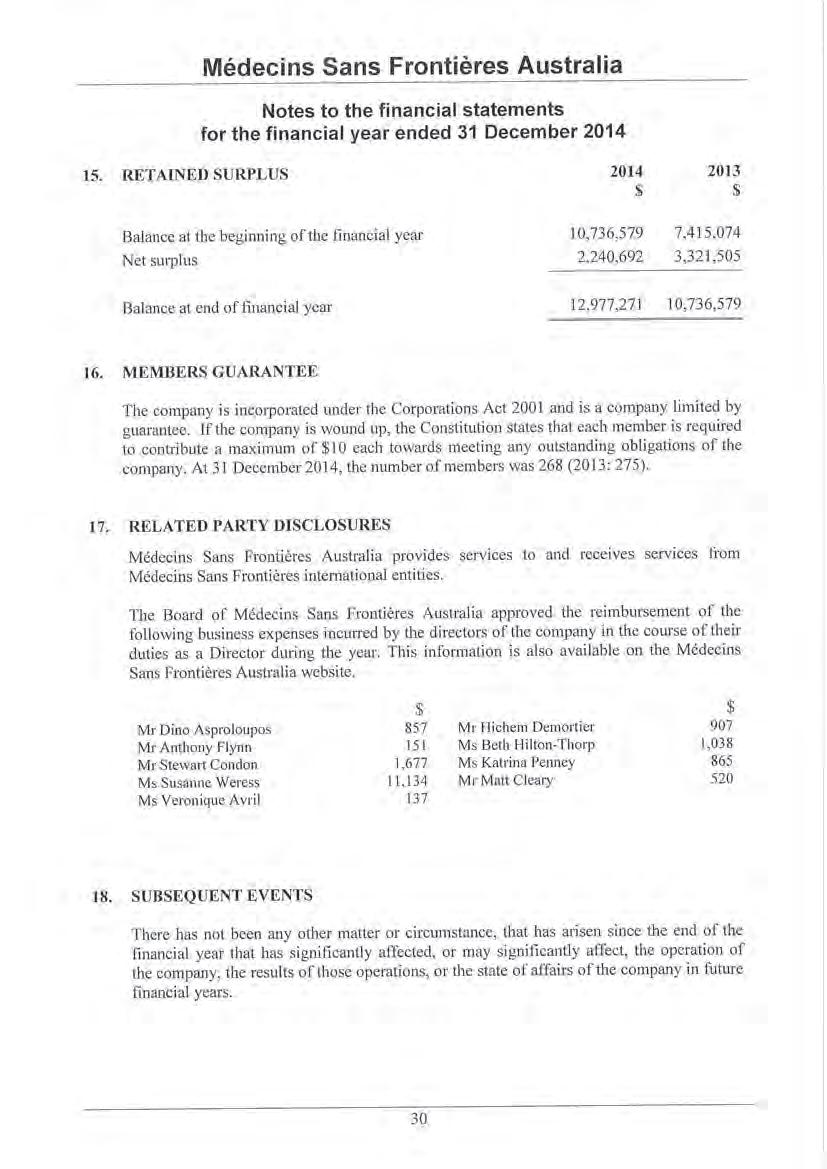

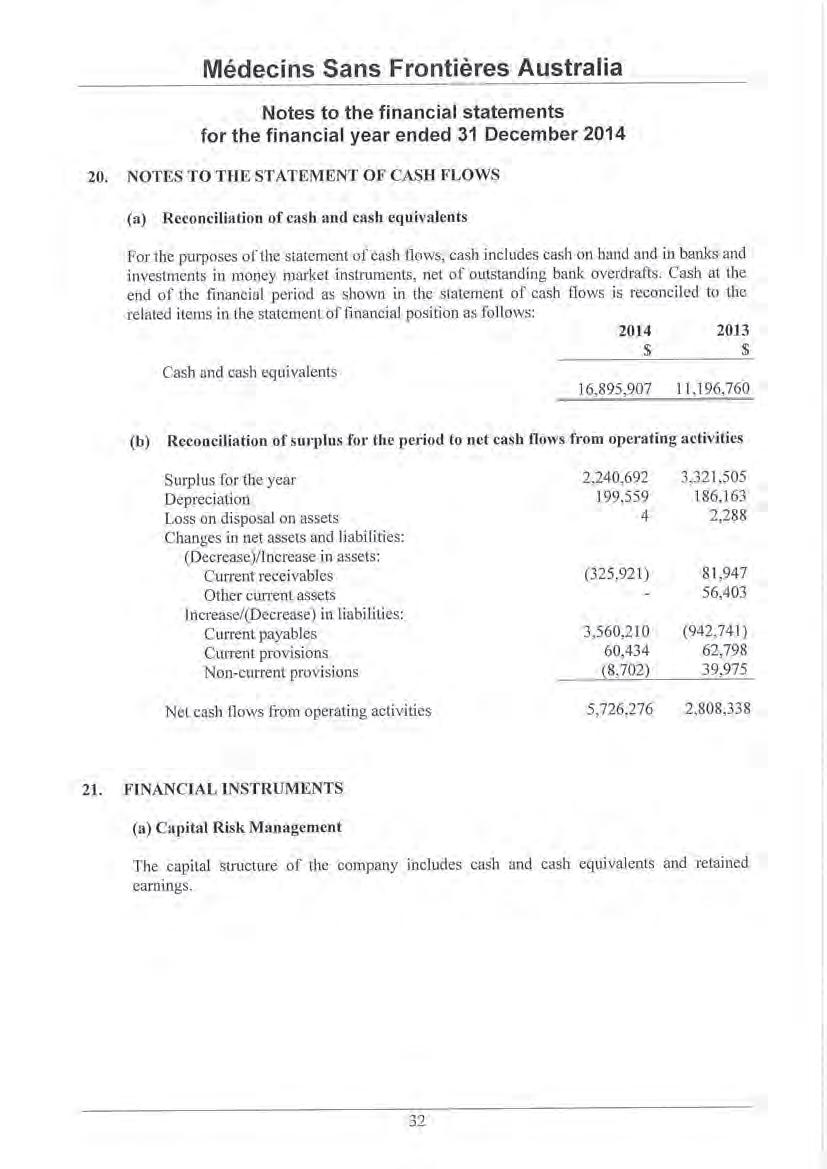

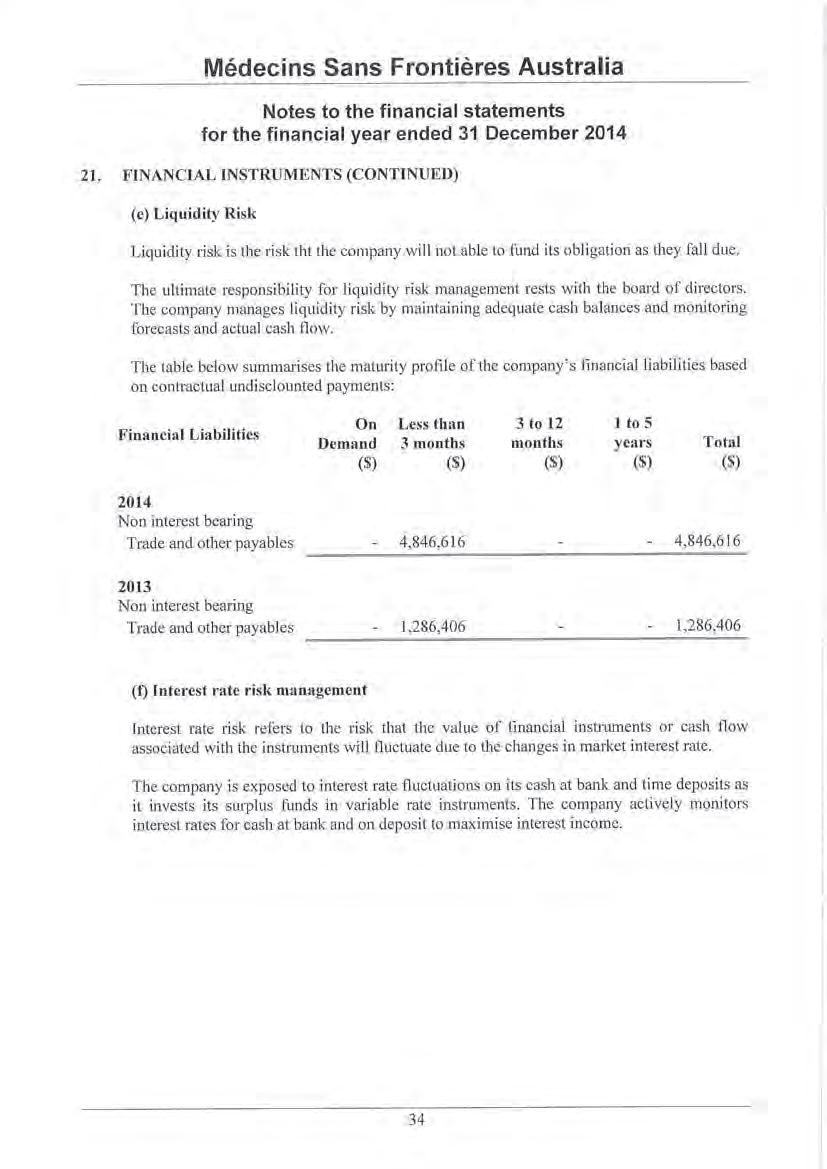
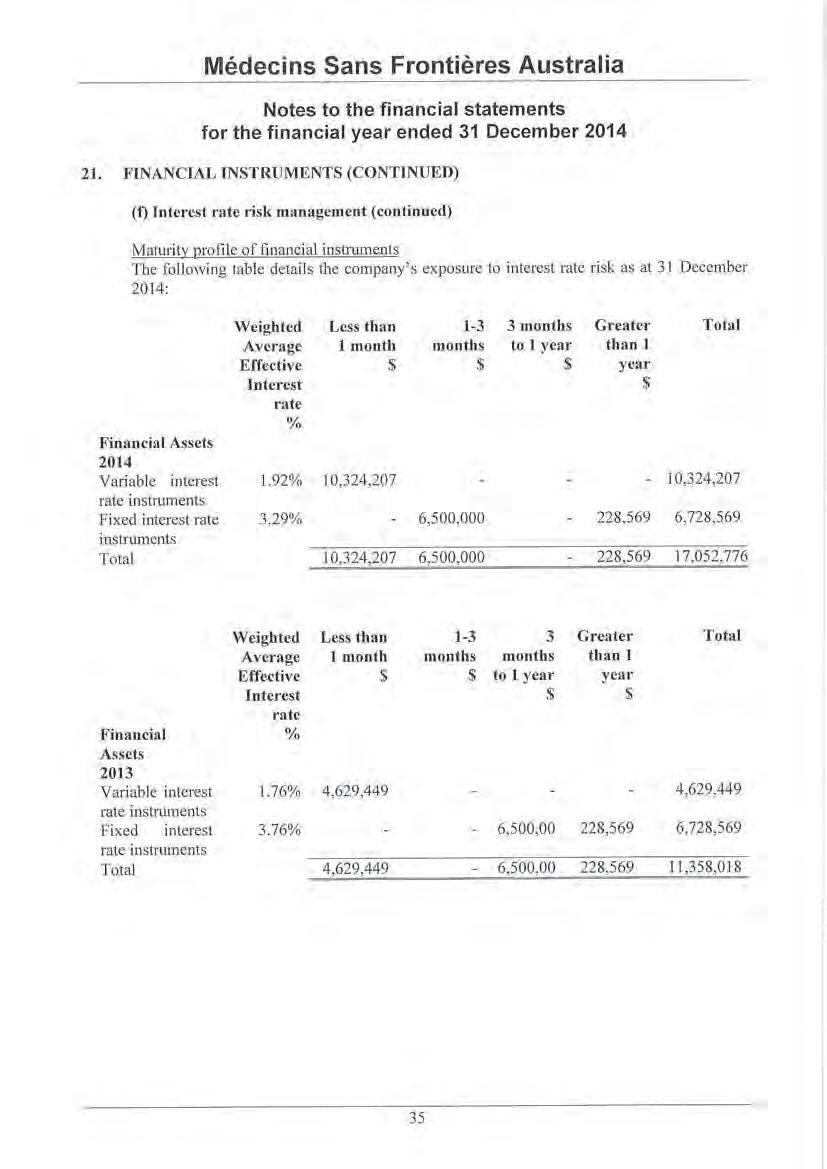



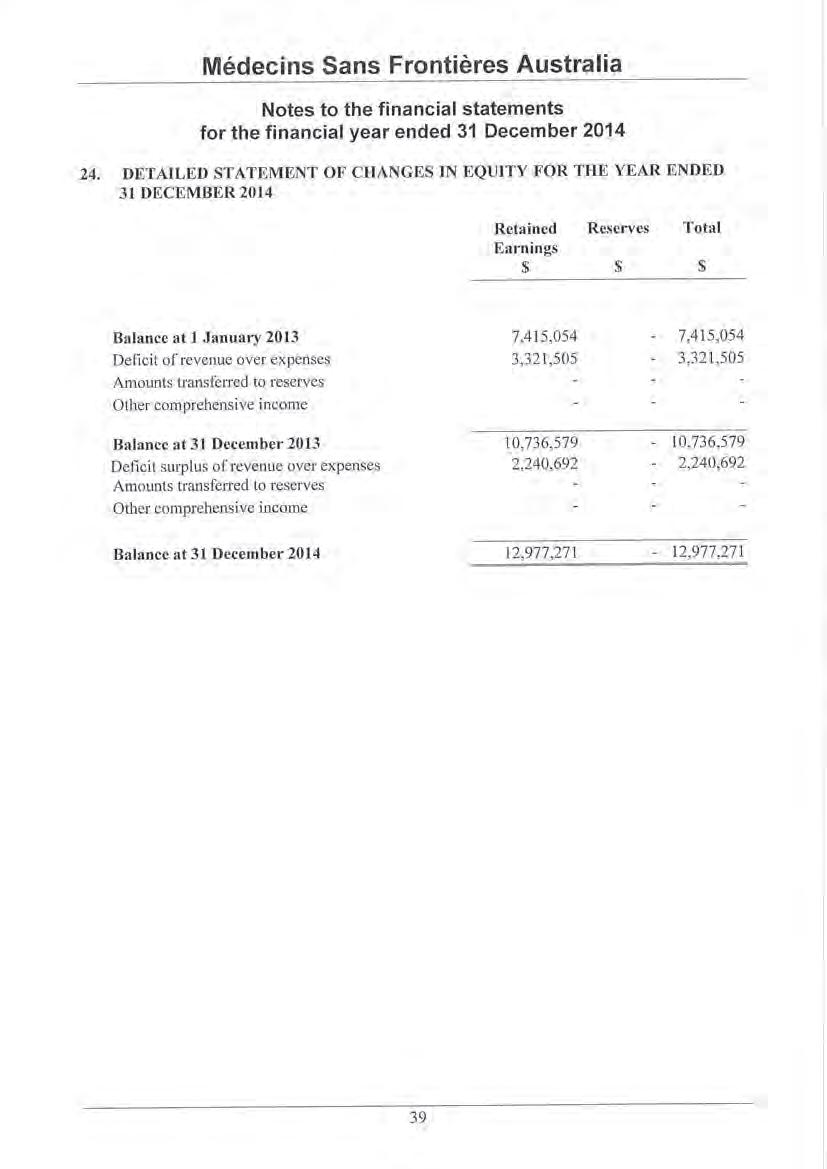
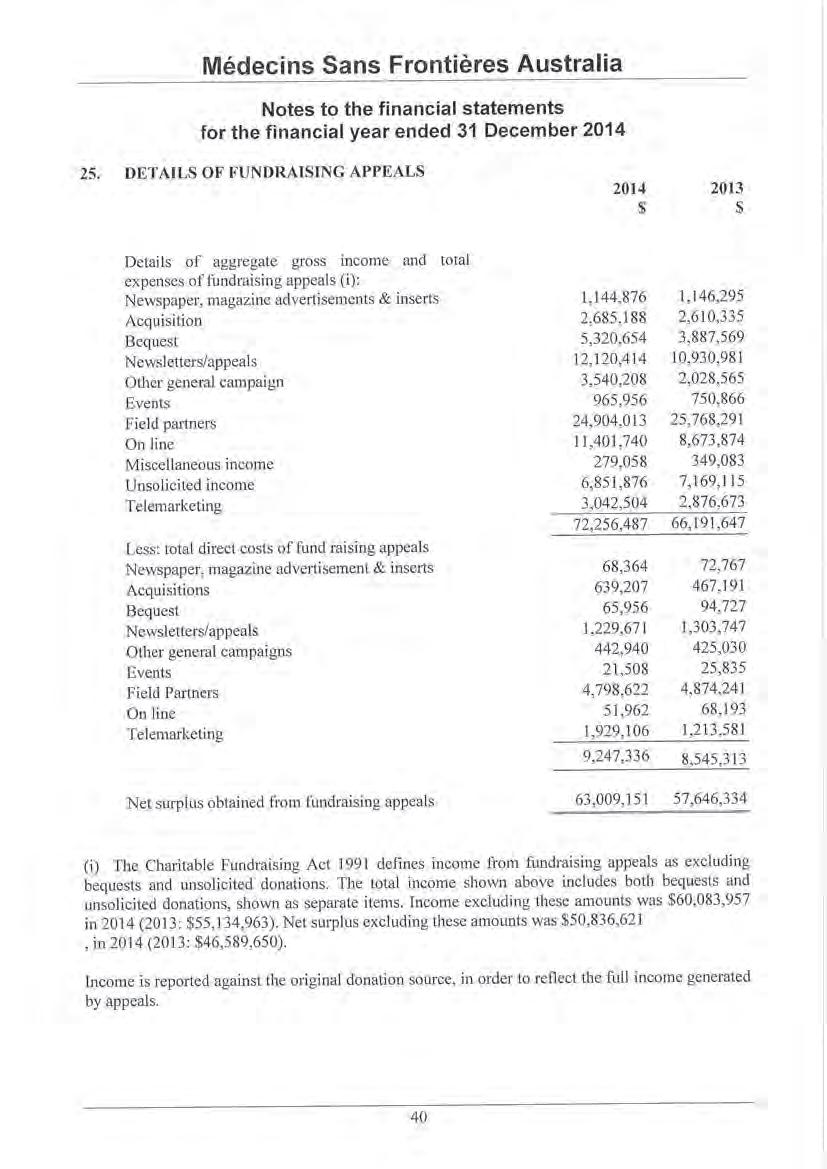


Médecins Sans Frontières Australia
ABN 74 068 758 654
PO Box 847, Broadway NSW 2007, Australia
Phone: +61 2 8570 2600
1300 136 061
Fax: +61 2 8570 2699
Email: office@sydney.msf.org
© 2014 Médecins Sans Frontières Australia
www.msf.org.au